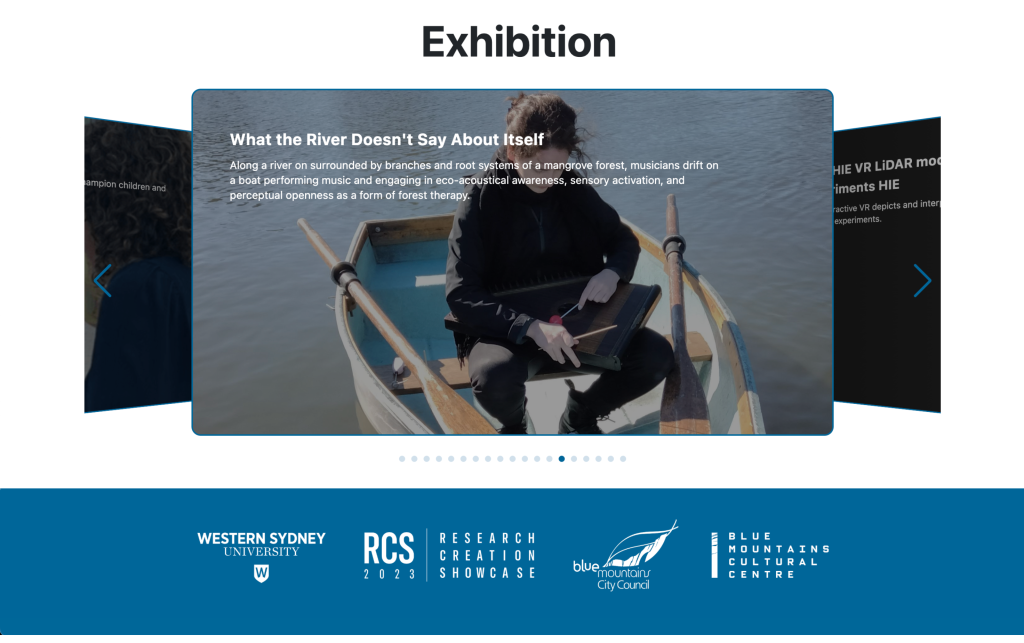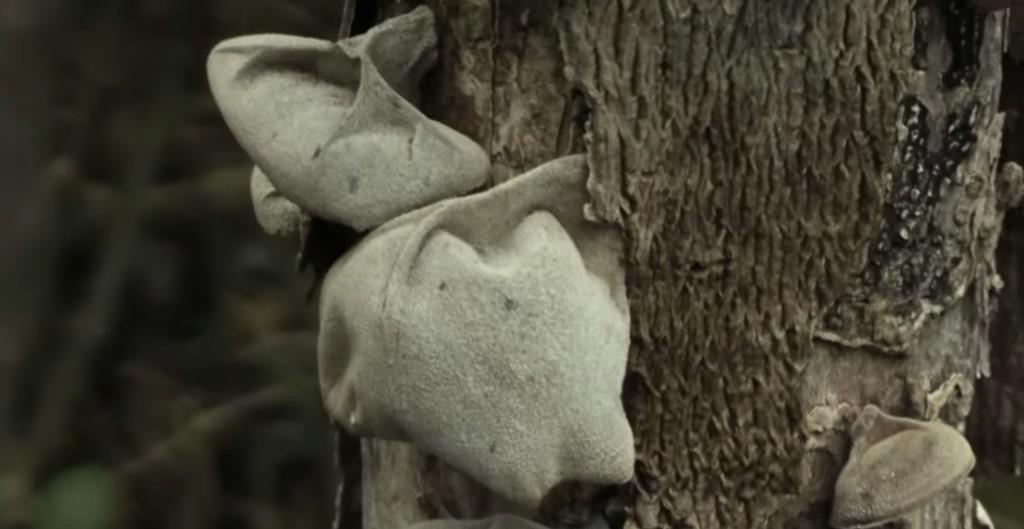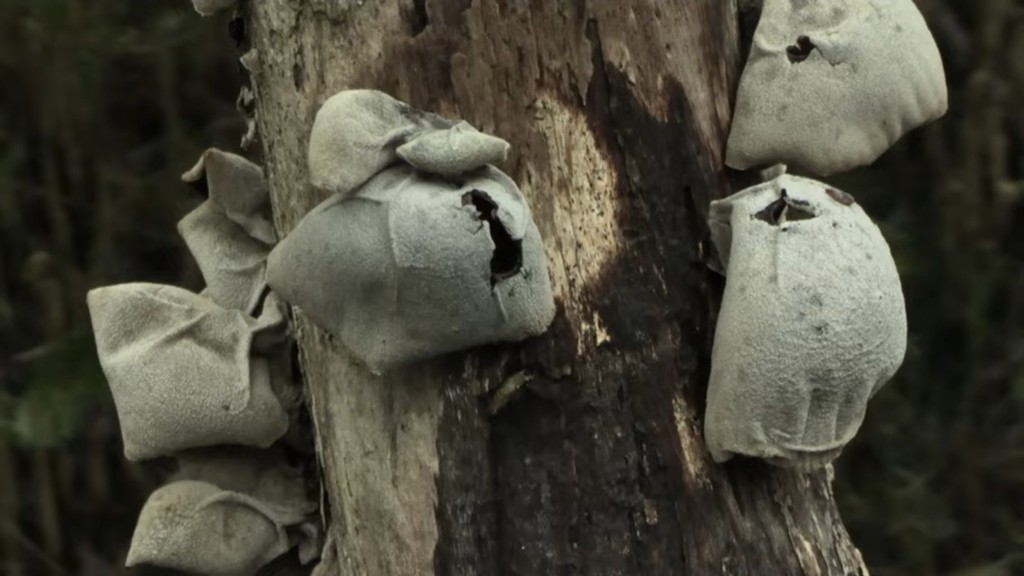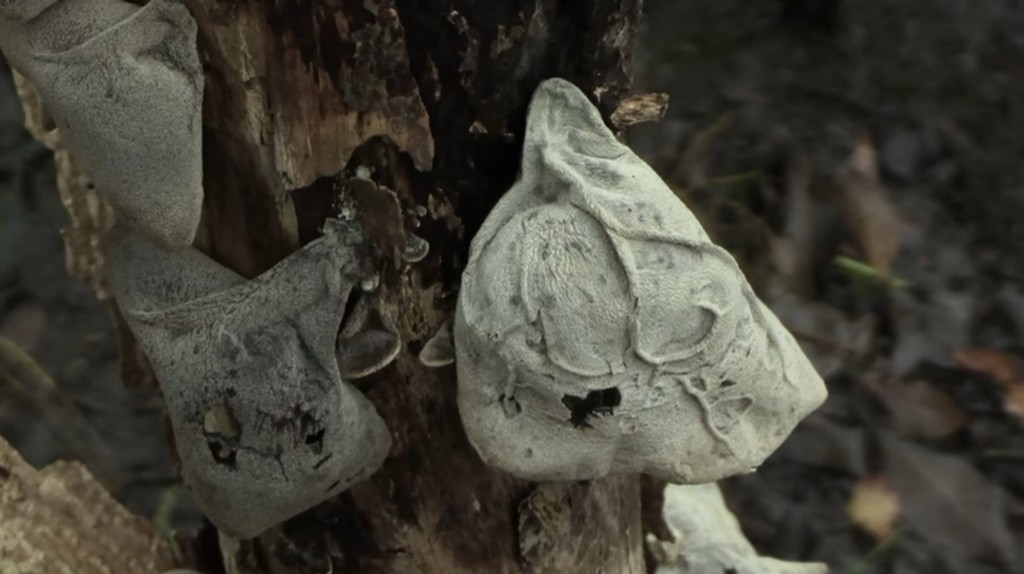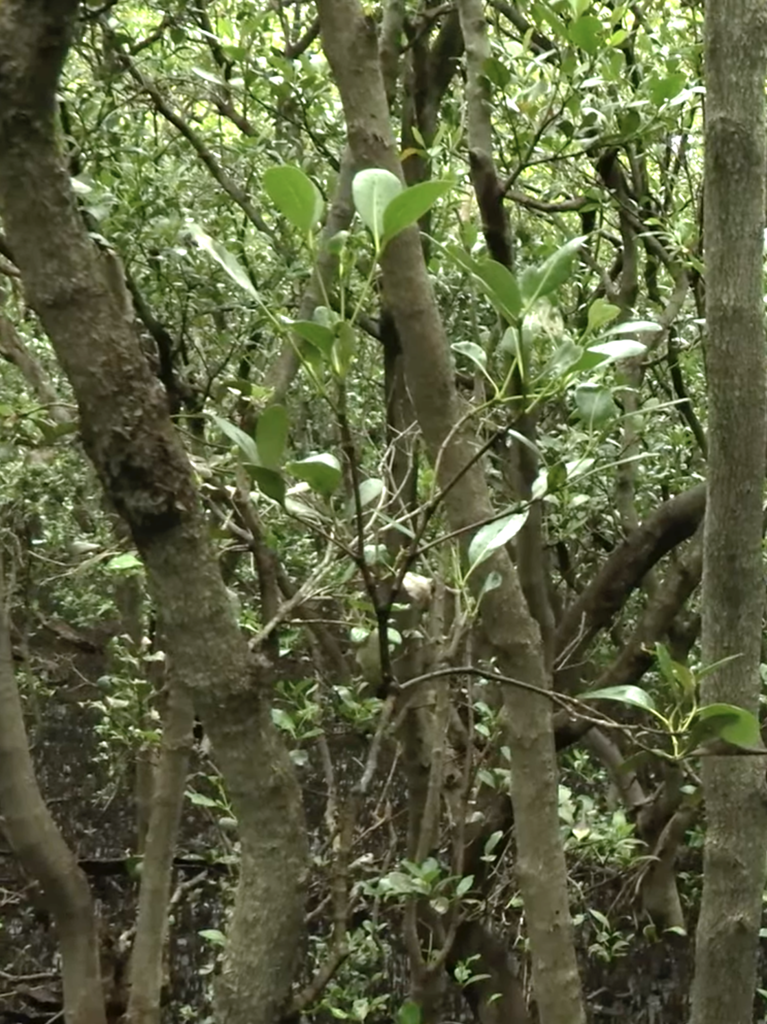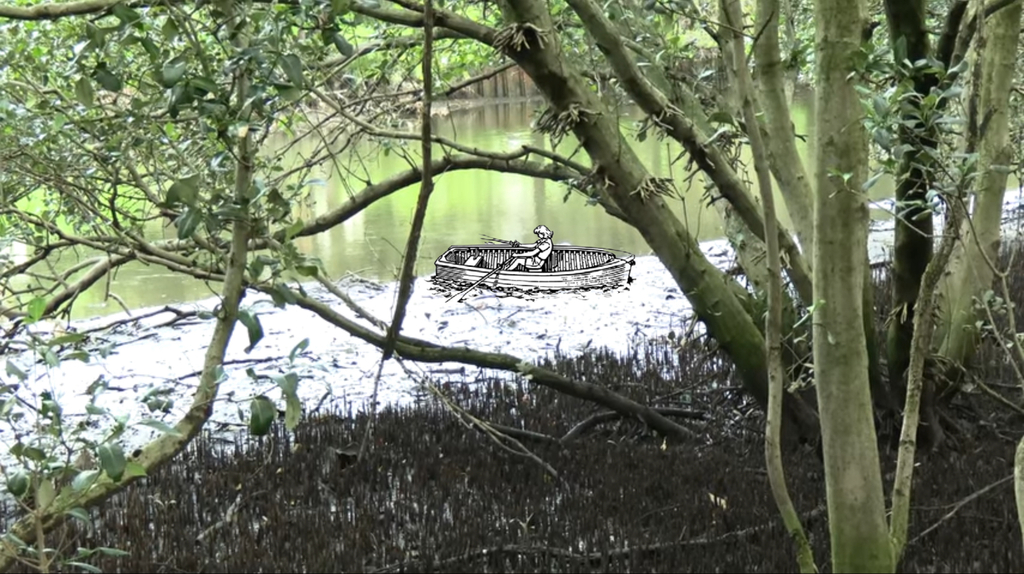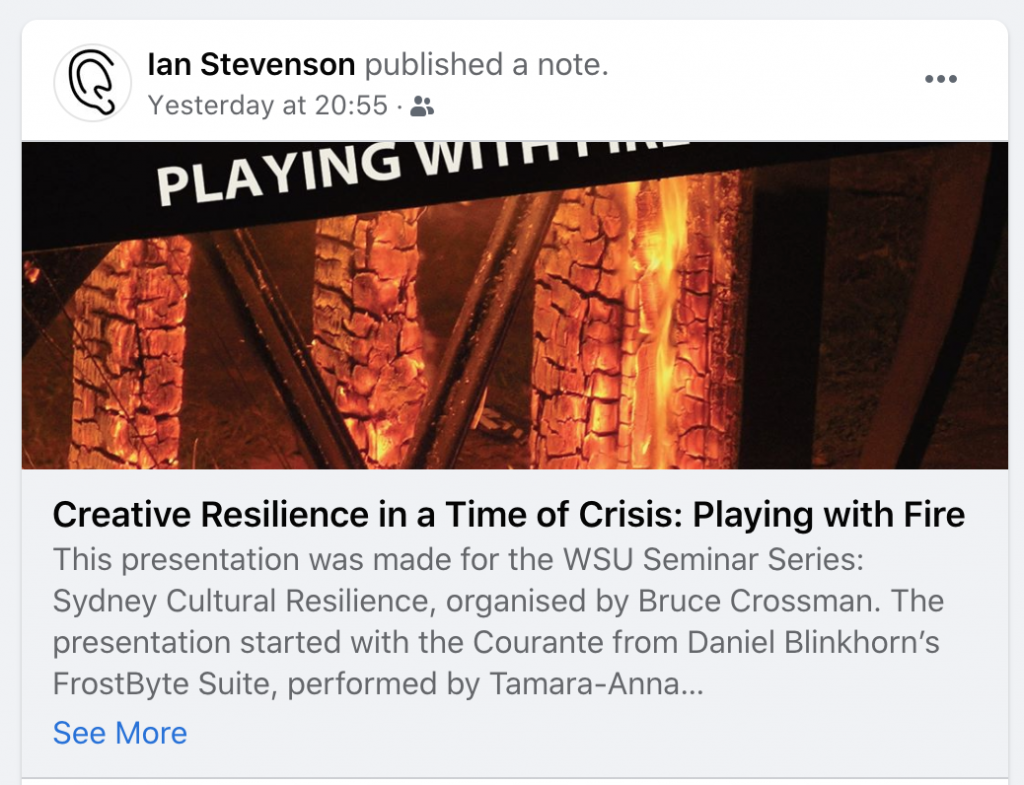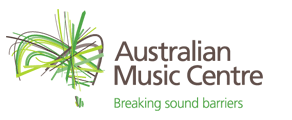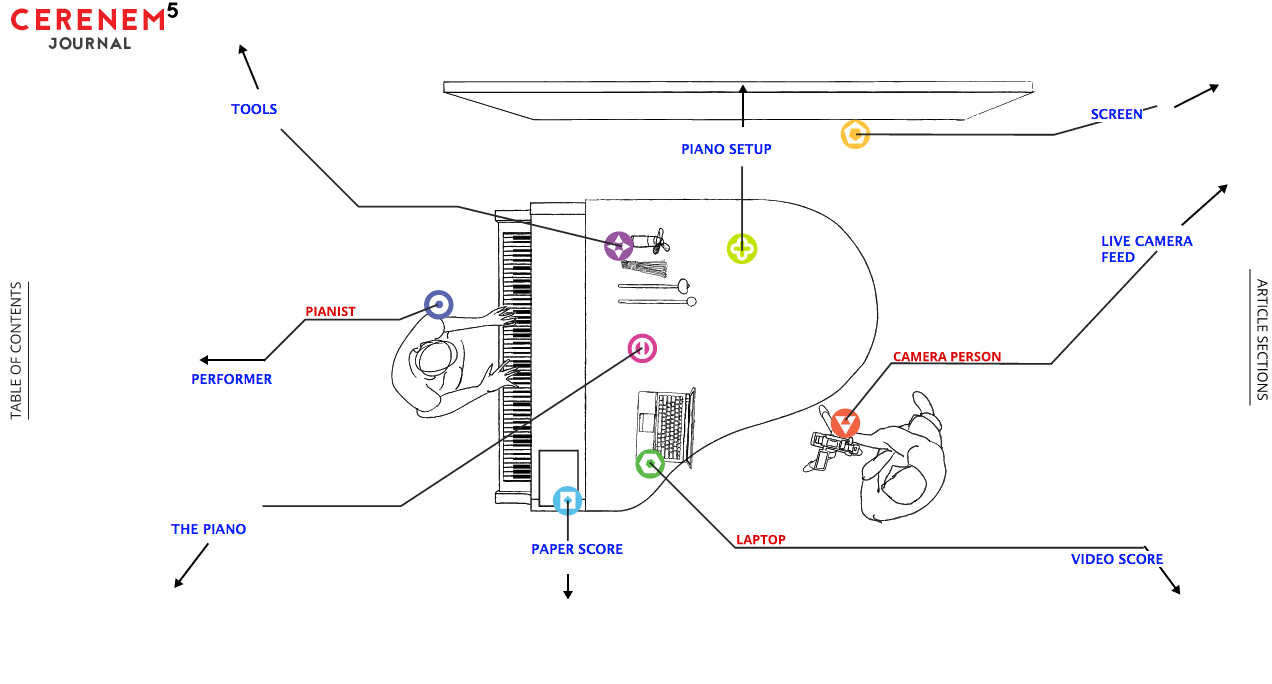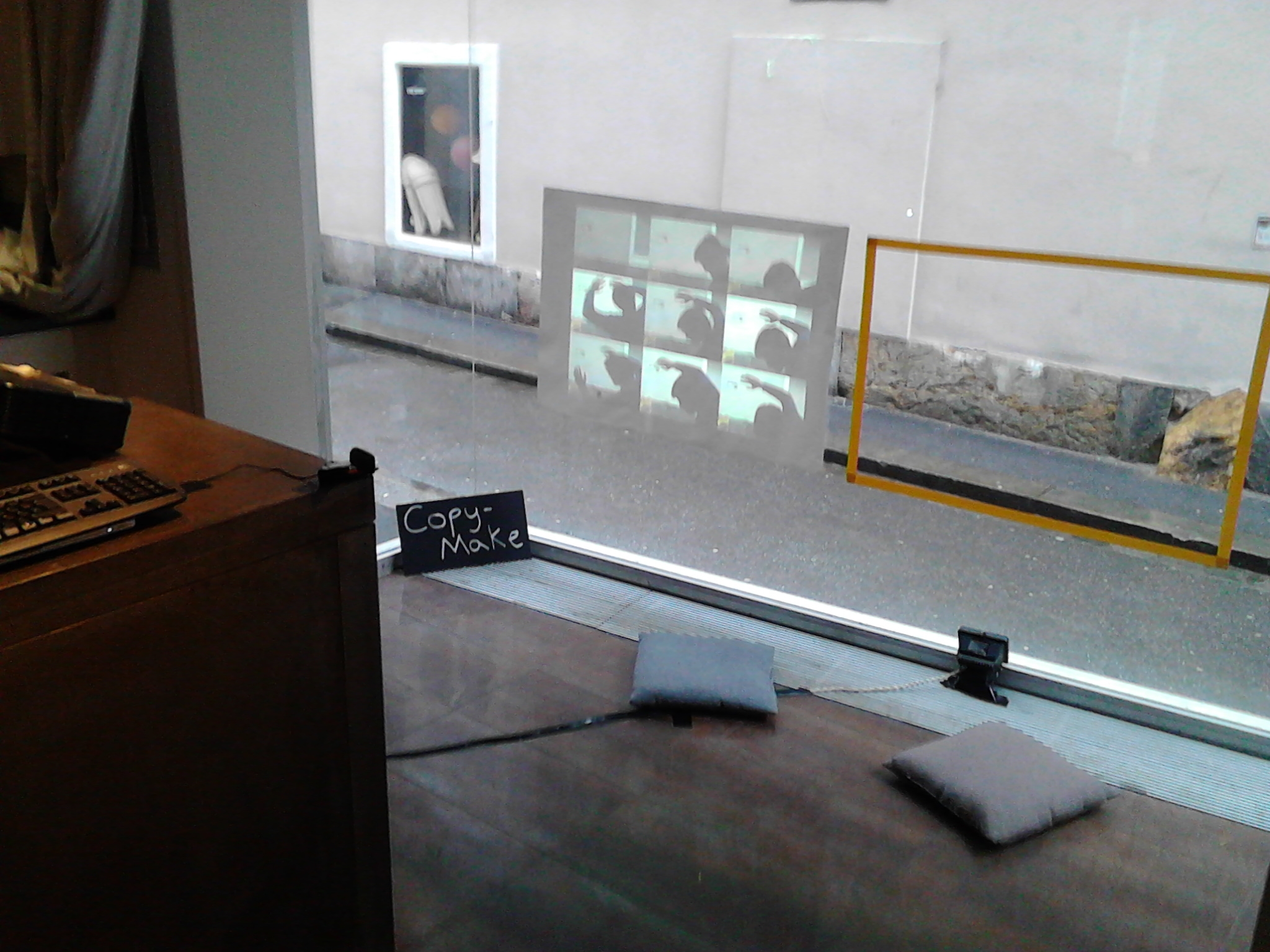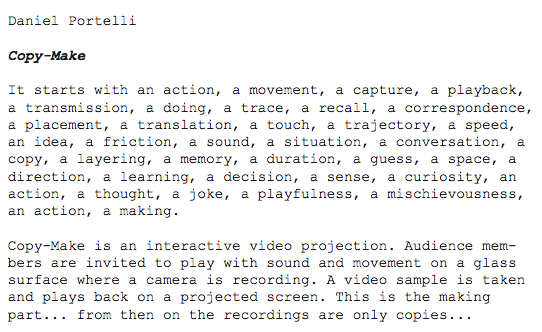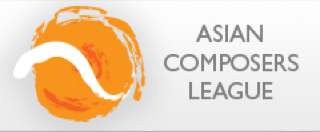News
Innersonic


My new work ‘Supralateral’ will premiere on 21 June 2024 at the Alte Schmiede house, in Vienna, at a concert called ‘Innersonic’. The piece is inspired by the molecular scatterings of light found in halos in the atmosphere, and a surrealism in sound, taking liberties through extensions, augmentation, warping, and variable incorporeality of sound. Instrumentation: bayan accordion, microtonal e-guitar, baritone sax, video, lo-fi electronics, and a starling bird whistle, premiered by Vertixe Sonora Ensemble. Check out some sketches and further notes on the piece here: https://danielportelli.com.au/supralateral/

Cutting Edge: What the River Doesn’t Say About Itself
Sound artist Daniel Portelli explains how an art music/video essay about our relationship with mangroves is a form of forest therapy.
by Daniel Portelli on 21 August, 2023


An article I wrote for Limelight Magazine for their September edition (2023). It’s about my ‘music on boats’ project (filmed on Gadigal and Wangal Country) that came out earlier this year. It includes interviews with member of the music box project. Special thanks to Claire Britton for her boat Sally and to Limelight for making it a feature article. Link to PDF
Book Chapter
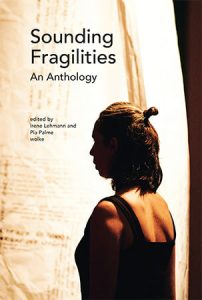
It was really great to have this write up about my ensemble work Whale Fall in the book ‘Sounding Fragility. An Anthology’ in the chapter: ‘Composing futures: Activism and ecology in contemporary music‘ edited by Irene Lehmann and Pia Palme. The writers invite readers into intimate encounters with an artist’s practice, feminist and queer perspectives, and personal explorations into aspects of musicology, theatre studies, technology and ecology.
It is a brilliant book that covers a range of important contemporary music artists, including: Elisabeth Schimana, Christina Fischer-Lessiak, Margarethe Maierhofer-Lischka, Irene Lehmann, Susanne Kogler, Suvani Suri, Flora Könemann, Veza Fernández, Paola Bianchi, Liza Lim, Electric Indigo, Juliet Fraser, Chikako Morishita, Germán Toro Pérez, Molly McDolan, and Chaya Czernowin.
Book: https://www.wolke-verlag.de/musikbuecher/lehmann-palme-sounding-fragilities/
Chapter: https://piapalme.at/wp-content/uploads/2022/08/SF_05_Palme_041-060.pdf
11 November 2023 – Such an incredible morning today with our first ever Composer Series event. Paul Smith did a fantastic job sharing his insights into making contemporary opera, and performing on the toy piano both solo and with clarinet player Ian Sykes. A great way to start the series. We had a range of audiences, some who had no musical background before to someone who had worked with Opera Australia from 20 years. Be sure to keep an eye out early next year when we have our next event.
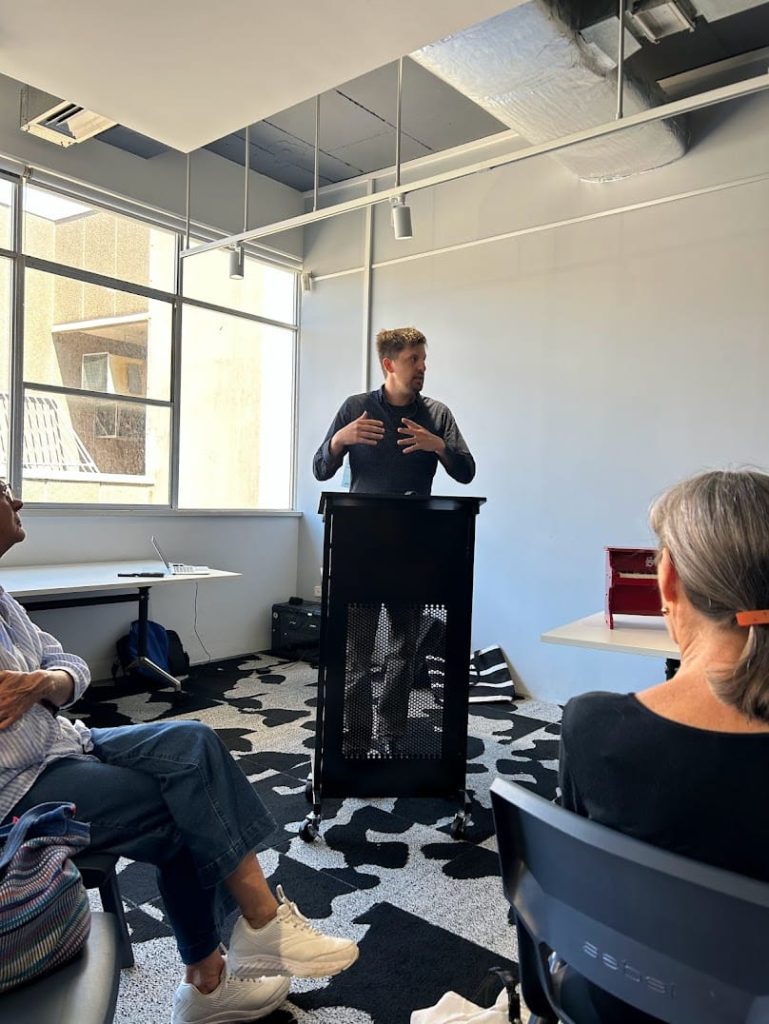
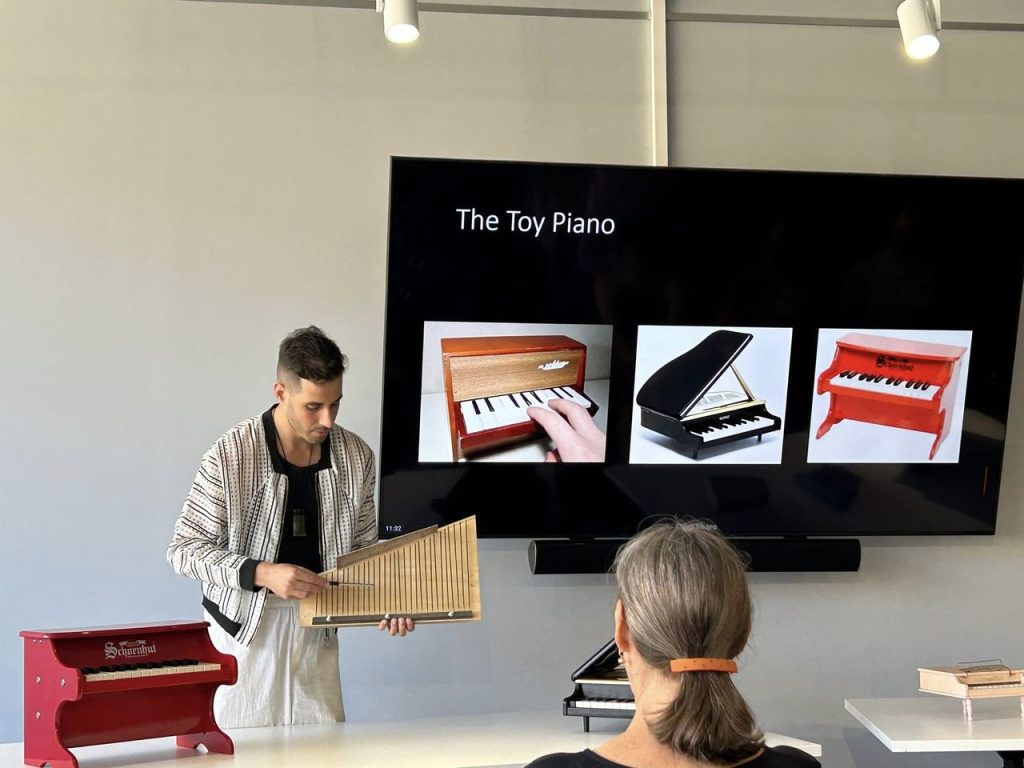

Here is an article that I wrote about the performance of 'Cosmic Time' co-created by percussionist/director Louise Devenish, composer Amanda Cole, and visual artist Michaela Gleave.https://t.co/aU5yHbuFE0
— Daniel Portelli (@danporto_) November 8, 2022
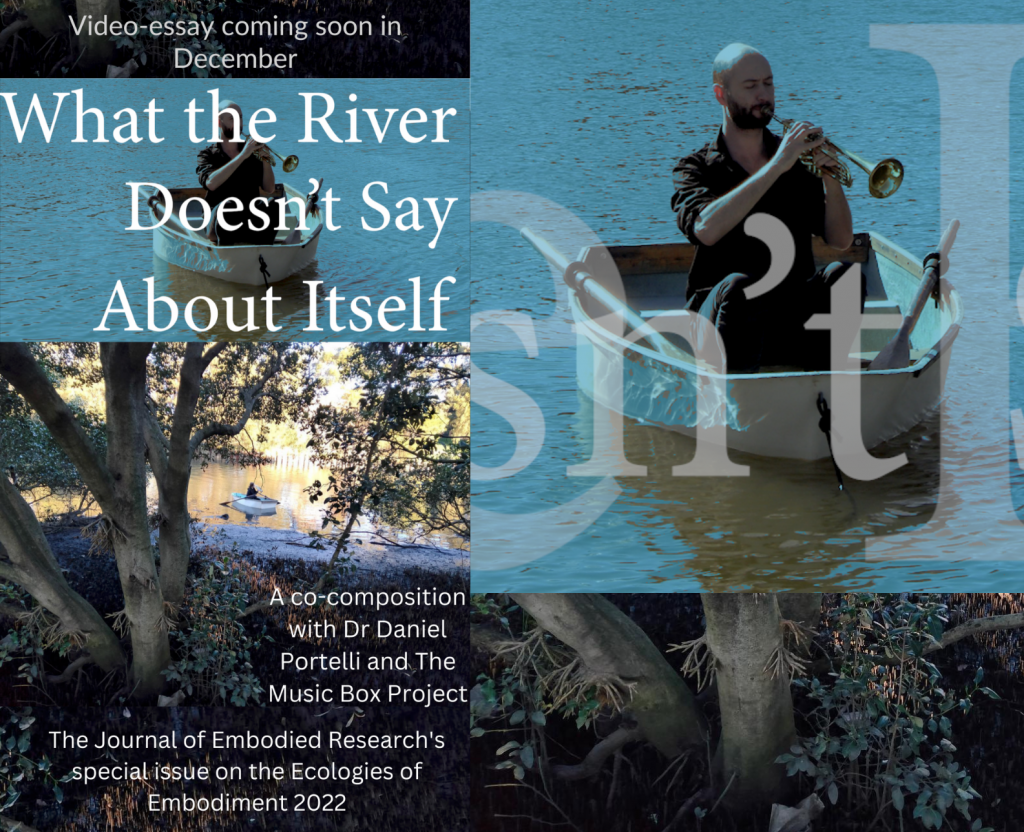
Congrats to ADSR Zine for winning the award for Excellence in Experimental Music for their 2021 activities, which included my work 'Music in Impossible Spaces' https://t.co/HZAOCxM1ja
— Daniel Portelli (@danporto_) September 1, 2022
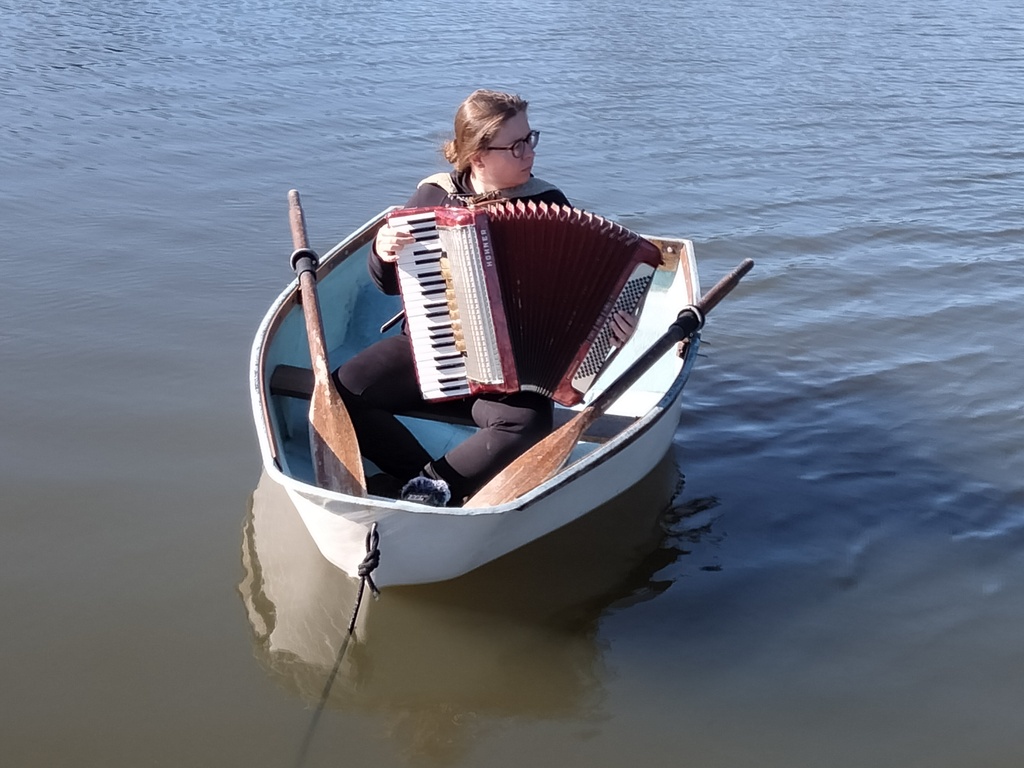
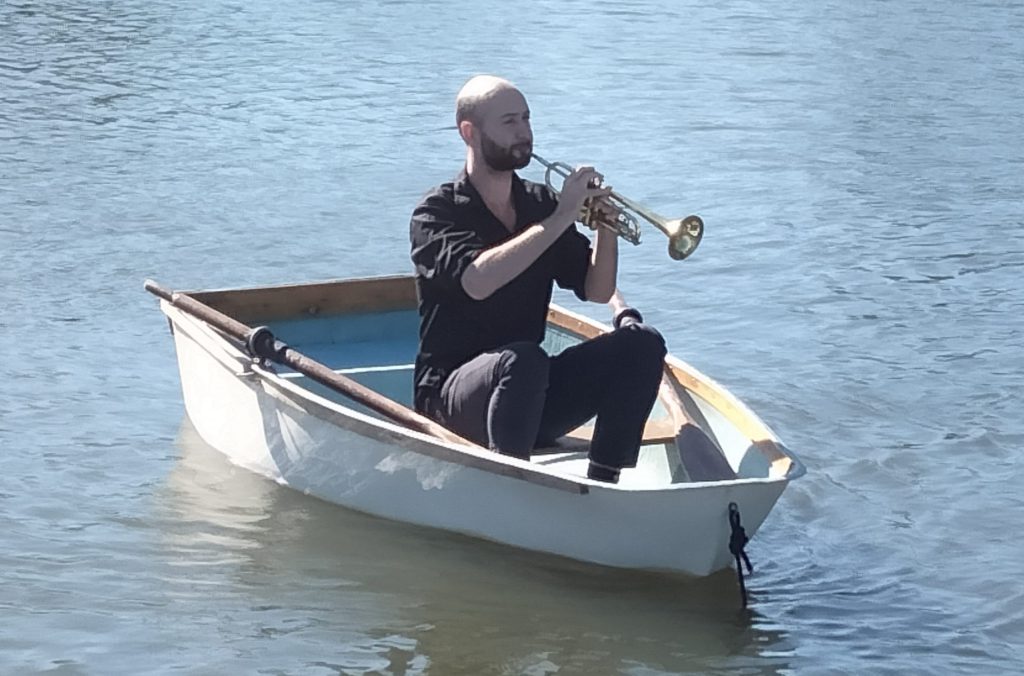
What the River Doesn't Say About Itself
Composer/sound artist Daniel Portelli’s proposal was accepted for inclusion in the Journal of Embodied Research online publication, for their special issue on Ecologies of Embodiment, 2022. The work will be in the form of a video-essay and is titled ‘What the River Doesn’t Say About Itself.
Along a river surrounded by branches and root systems of a mangrove forest, musicians drift on a boat performing music and engaging in eco-acoustical awareness, sensory activation, and perceptual openness – appreciating the higher order purpose of the river, as a form of forest therapy
Through this video-essay I explore how a mangrove forest can affect sensoriperceptual meaning and into the production of thoughts and sounds. Questions like: How our body matrix, peripersonal space, and bodily consciousness affects the mangrove. How we can engage in deep embodiment practices involving motor schemas and body memories to create a neurological binding with a wider ecology? How can humans listen, relate, correspond, and synthesis with the articulations present within living systems?
Daniel is working with members of The Music Box Project, working from a score to develop experimental music with spoken word, text, animations, and video. More information about the project.
—————————-
ADSR Zine: Special Collection Exhibition
21st Century Grapefruit
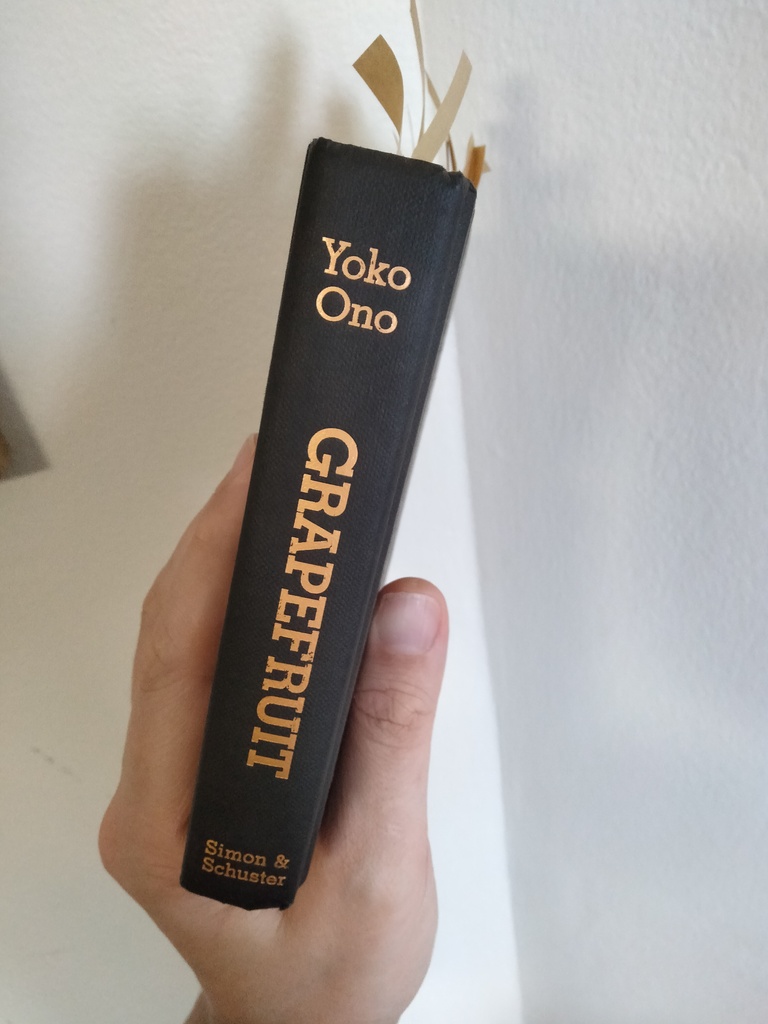
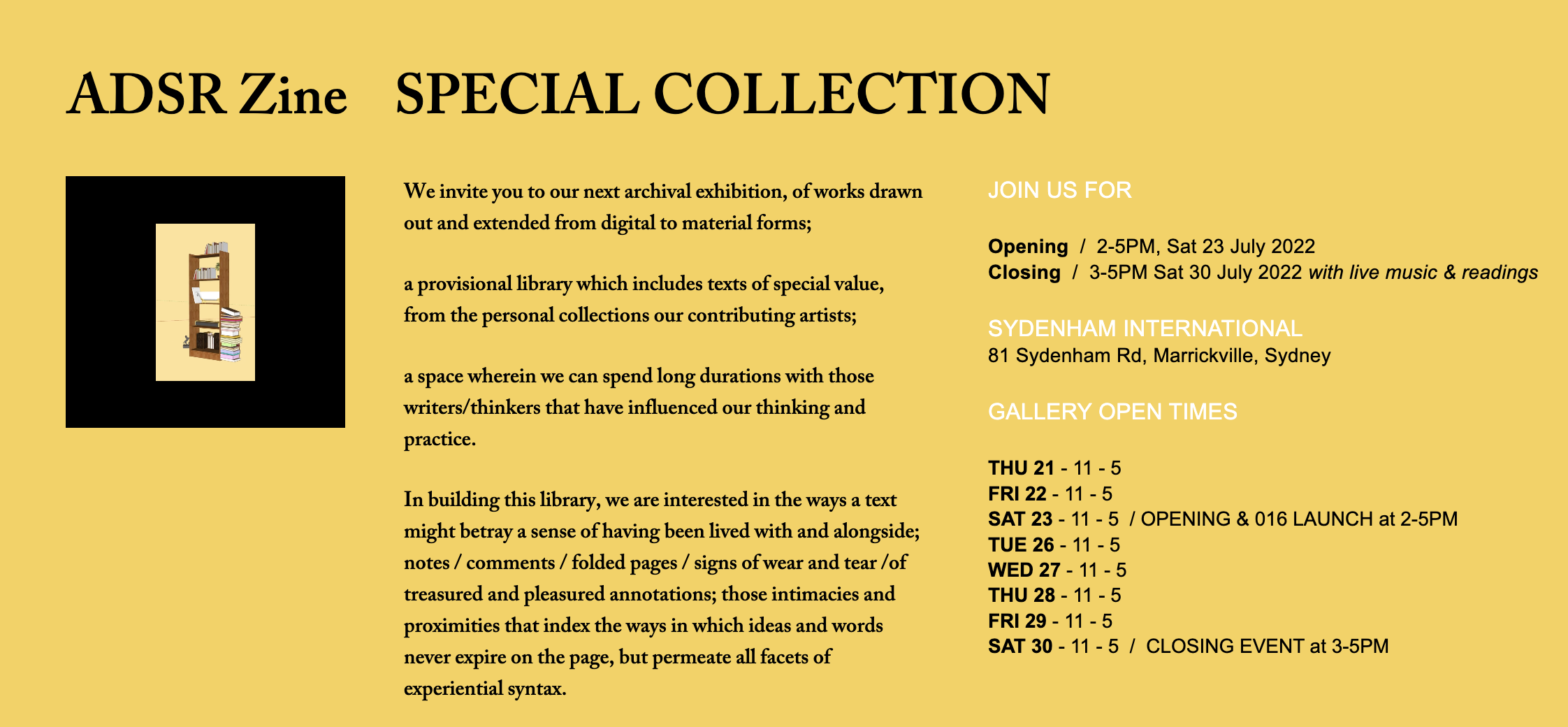
I gathered together a collection of found objects for an experimental sound art workshop run by Gail Priest at Liveworks Festival of Experimental Art, Carriageworks, 2020.
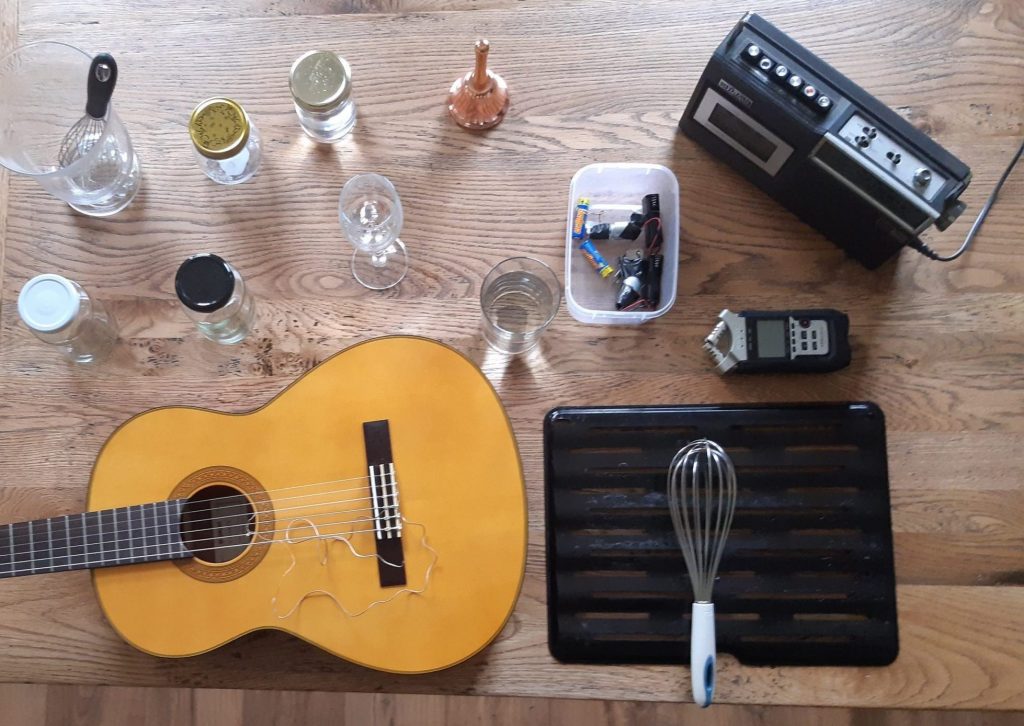
Donna Chang and I created an installation, Water Pail, which exhibited at World Square, Sydney, as part of the Now You Hear Her festival. Curated by Lamorna Nightingale, Bree van Reyk and Damian Barbeler, from the 8 March to 11 April 2021
Water Pail is a sculpture and sound art installation about the artist’s Donna Chang’s intersectional Chinese-Australian identity and her mother’s and her maternal grandmother’s life in Hong Kong during the 1960s-80s. The work is based on the stories we documented from Donna’s mother, Monica. Monica lived during Hong Kong’s water famine, and experienced significant hardship and poverty. As a young child Monica had to carry a pail of water up multiple flights of stairs everyday to get fresh water. For more information click here.
Music in Impossible Spaces
ADSR ZINE
My article was just published with ADSR Zine. ADSR Zine is an online quarterly publication that features diverse work from contributors who are, or who work with, contemporary practising artists in Australia. For the first time, they are going live with performances, readings and an exhibition of works by zine contributors. https://www.adsrzine.com/013
My article is called ‘Music in Impossible Spaces’ and is a discussion on virtual heterotopias, the limits and dimensions of sound in dreams, decorporalised music, and a muse on our inner imaginary sonic experiences. The act of dreaming during a pandemic could be seen as a type of heterotopia in relation to the ongoing crisis; a safe space for the mind to wander, and to express what is not possible in the outside world. The article draws on recent neuroscience and philosophy of the mind to speculate about the nature of sound and music in places of Otherness and proposes open graphic scores for musicians to perform in various dream states. Link to article.
This edition is as sprawling and engaging as ever, featuring artists: Shireen Taweel; Annie McKinnon; Joseph Franklin; Karen Cummings; Daniel Portelli; Ria Andriani; Rebecca Lloyd-Jones; Cynthia Troup; Glenn Sloggett; and Si Leong.
This edition we cover a lot of ground, featuring: explorations into the limits, violence, and problematics of contemporary opera; photographs of the neglected and living suburban everyday; heterotopic dream scores; long-form poetry on the tumbling fragments and remains of trauma; memories of space, place and the comforts of a grandmother’s bathroom in Tripoli; the small neglected (and uncanny) rituals of the hand; the loss of embodied knowledges; a frank & vulnerable reimagining of past practice-as-research; meditations on how fantasies so easily coalesce into conspiracy in the post-truth age; and a re-framing of percussion-based performativity via the poetics of the feminine.
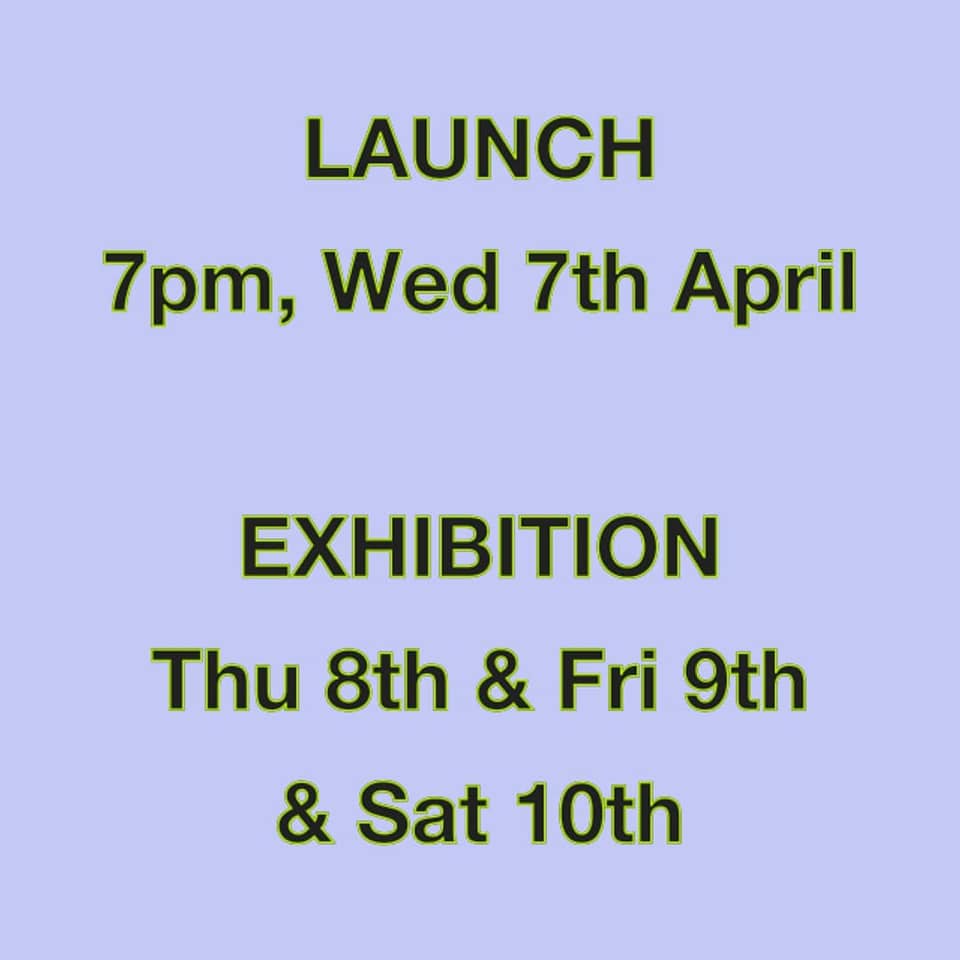
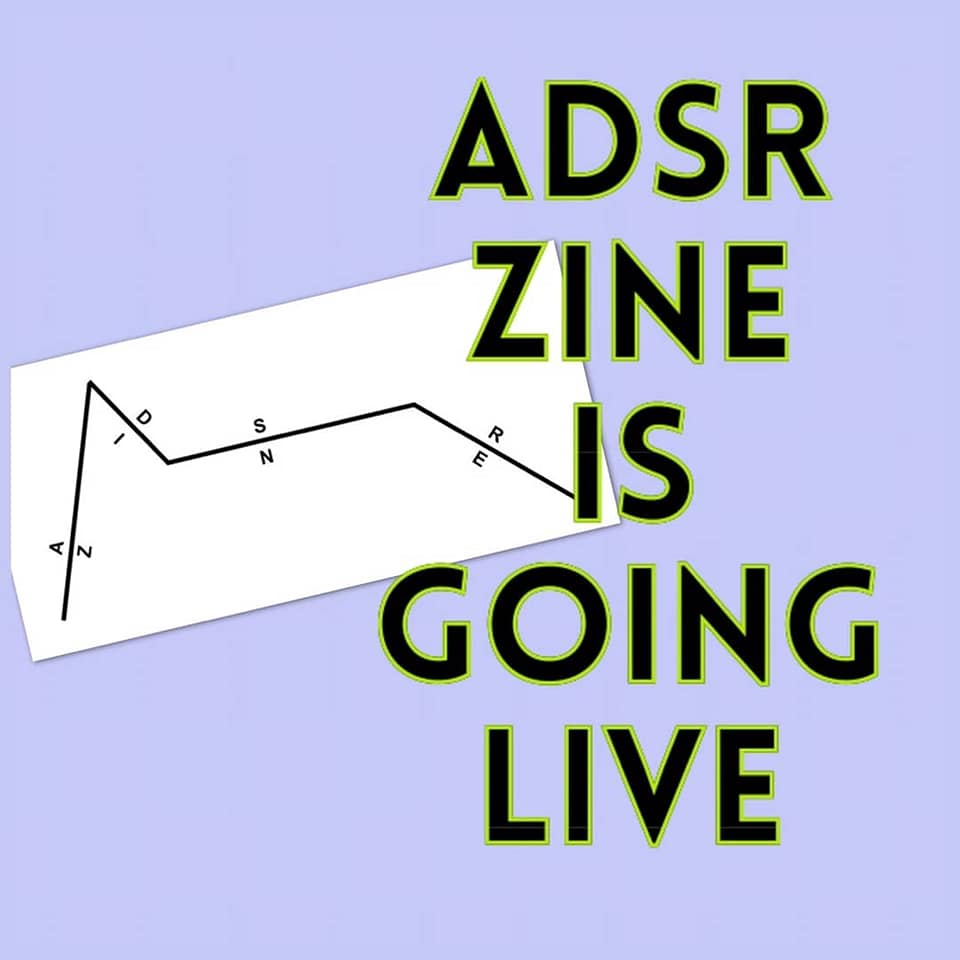

I wrote a review of Decibel New Music: 2 Minutes from Home project which you can read on Resonate Magazine. @ausmusiccentre https://t.co/O0EUnGbawu
— Daniel Portelli (@DanPorto) April 19, 2021
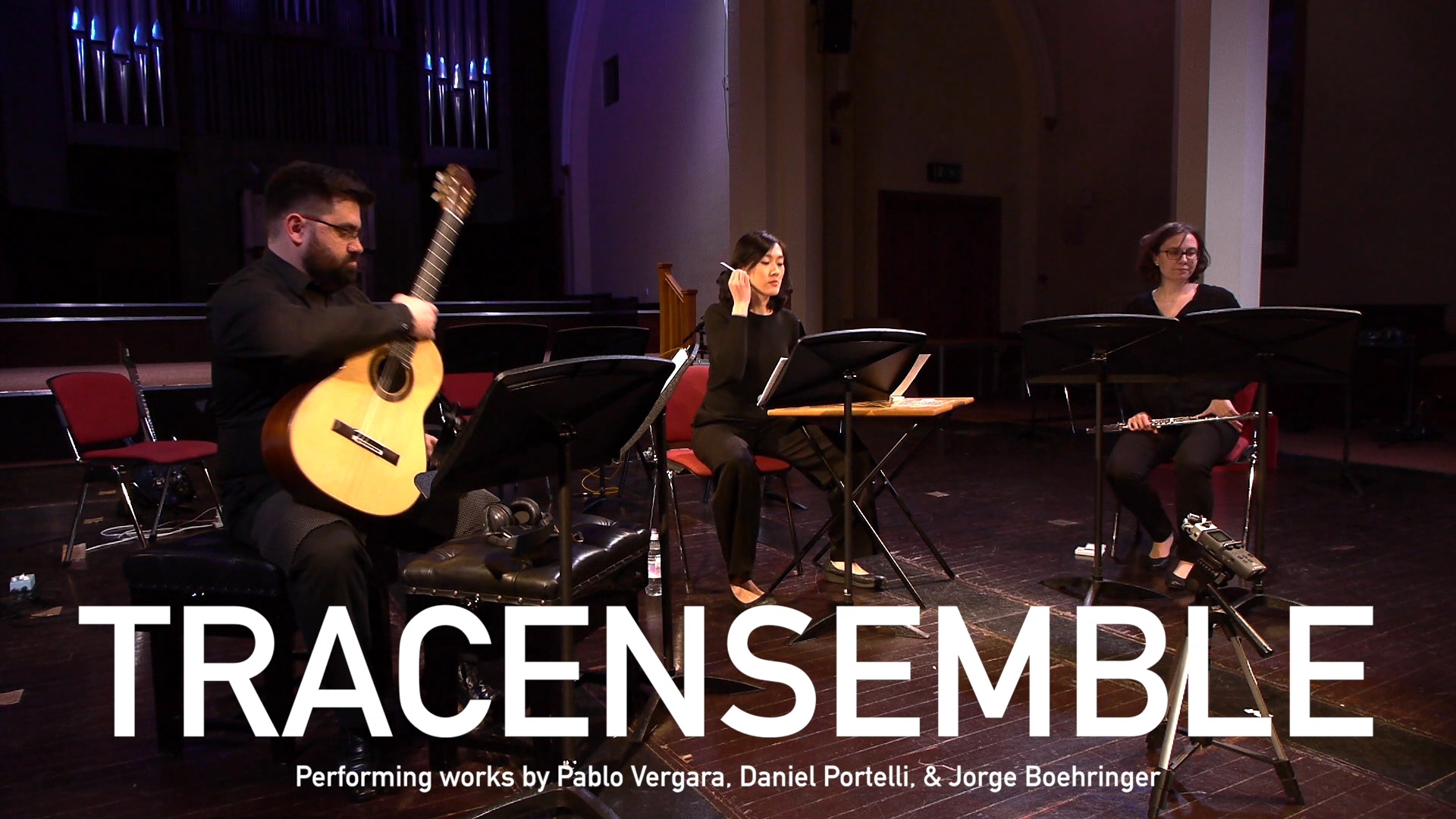
Album release: Playing with Fire - available now on Spotify
‘Playing with fire’ is an album of electro-acoustic compositions performed by pianist Tamara Anna Cislowska. A 2020 release under the label Wirripang Media Pty. Ltd. The music is by some of Australia’s leading composers: Daniel Blinkhorn, Thomas Reiner, Leah Kardos, Daniel Portelli, Stephen Adams, Robert Davidson and Brendan Smyly. It features Daniel Portelli’s piece Mapping Australia.
The work featured on the New Australian Art Music playlist which is a weekly playlist of new Australian art music (contemporary classical, jazz, and experimental electronics) by living composers, curated by composer Cameron Lam. The December edition featured in Limelight Magazine.
Journal publication with Leonardo Music Journal and MIT Press
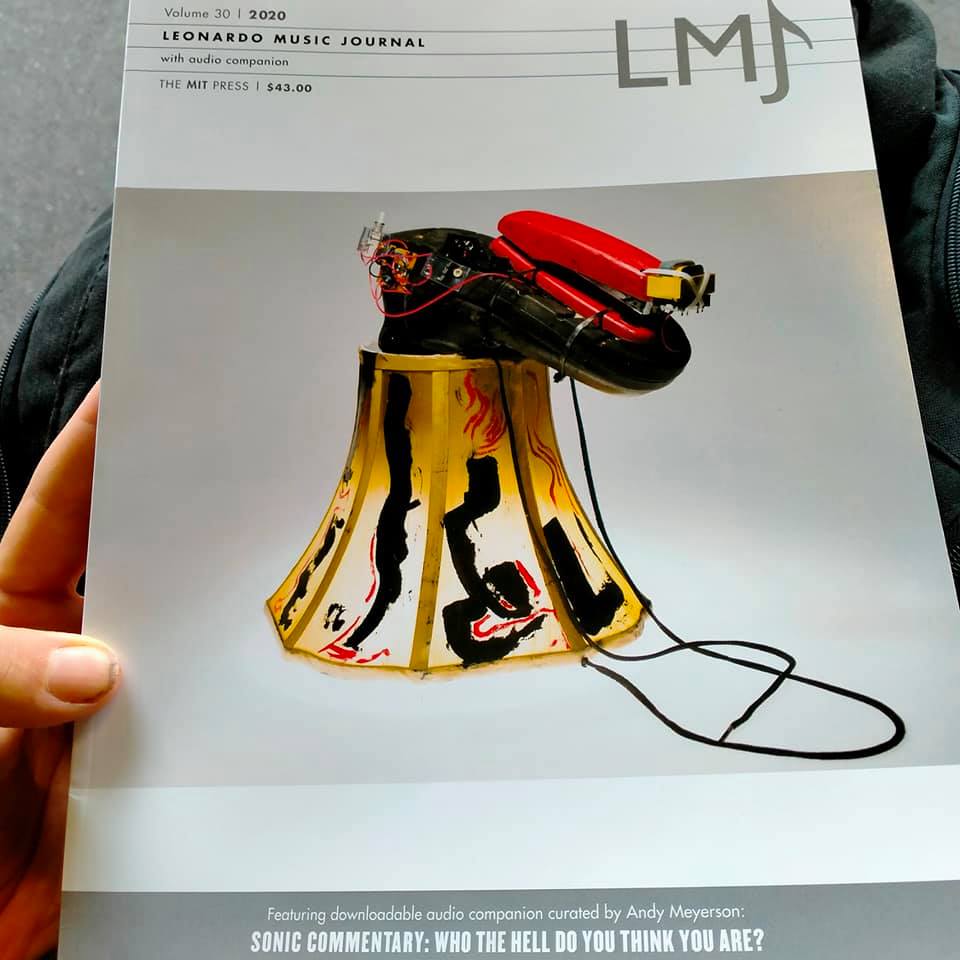
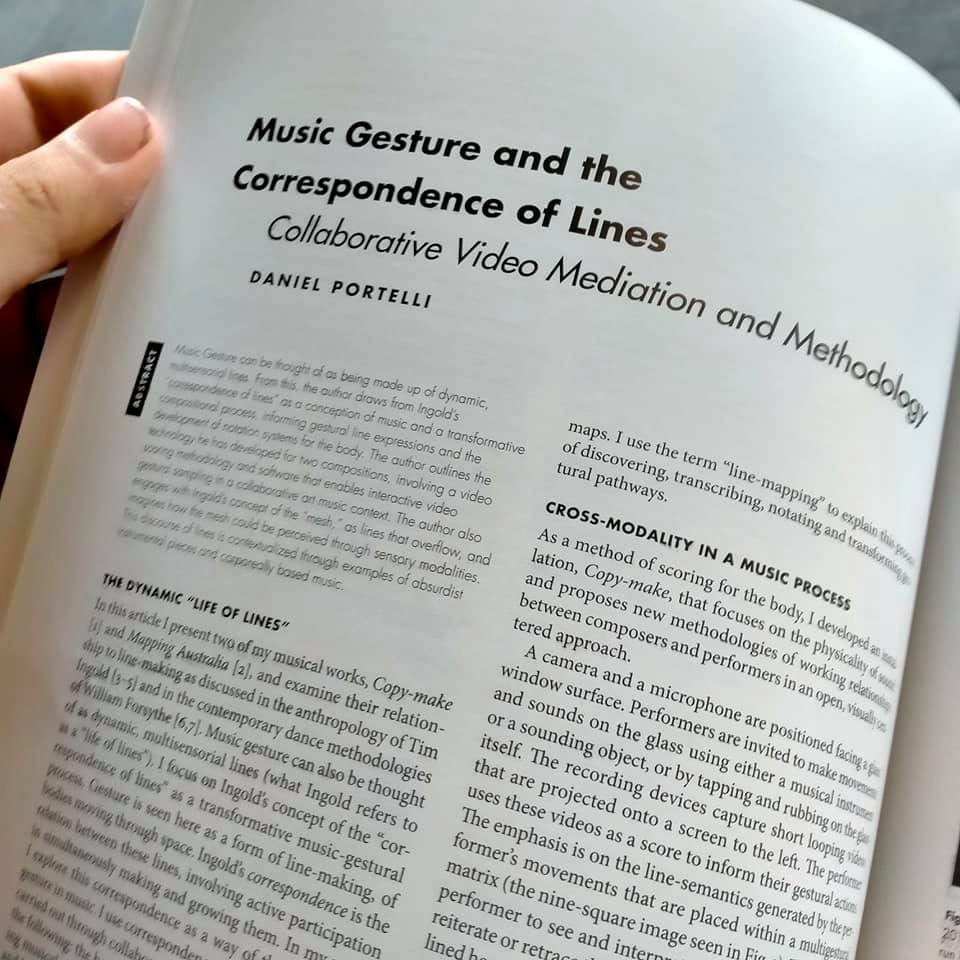
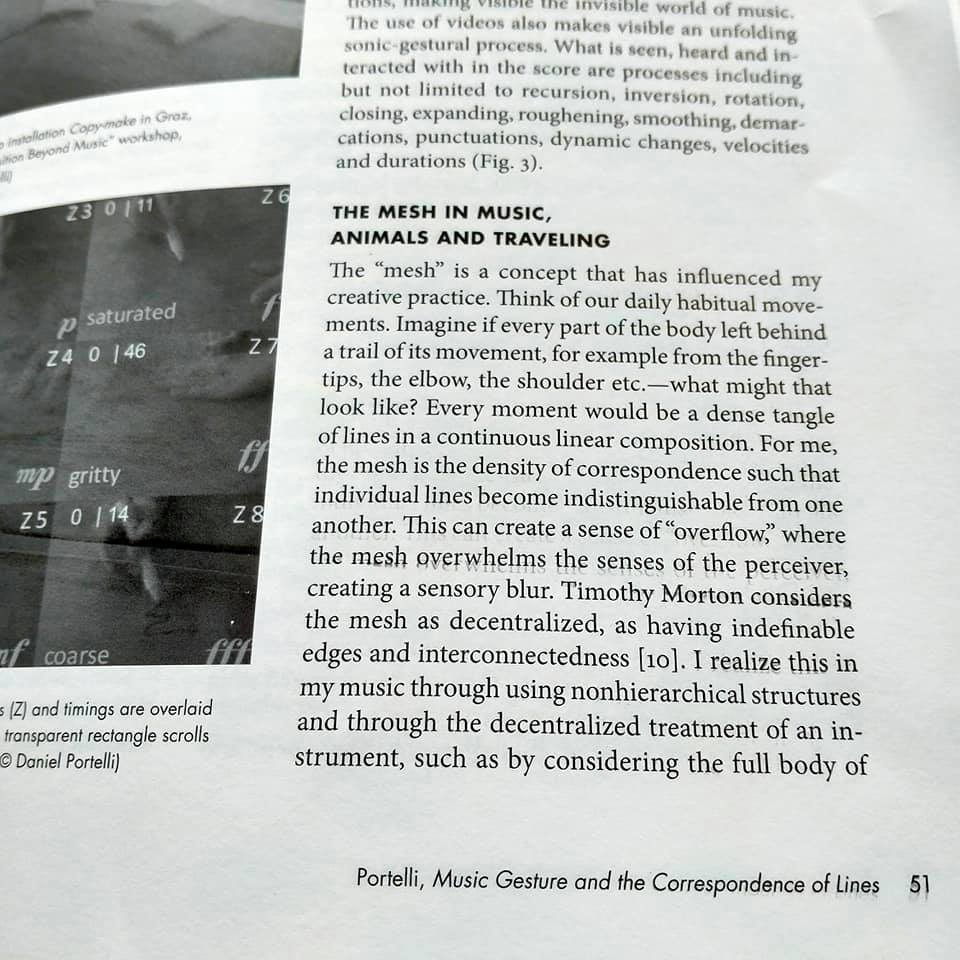
Daniel’s paper was accepted for publication with Leonardo Music Journal and MIT Press and will come out in December 2020.
Leonardo Music Journal (LMJ) is devoted to aesthetic and technical issues in contemporary music and the sonic arts. Each thematic issue features artists and writers from around the world, representing a wide range of stylistic viewpoints. Recent issues have covered improvisation, musical communities, live performance in the digital age, and the politics of sound art.
His paper is entitled: Music gesture and the correspondences of lines
Collaborative video mediation and methodology
Abstract: Music gesture can be thought of as being made up of dynamic, multi-sensorial lines. From this, the author draws from Ingold’s “correspondence of lines” as a conception of music and a transformative compositional process, informing gestural line expressions and the development of notation systems for the body. The author outlines the technology he has developed for two compositions, involving a video scoring methodology and software that enables interactive video gestural sampling in a collaborative art music context. The author also engages with Ingold’s concept of the “mesh,” as lines that overflow, and imagines how the mesh could be perceived through sensory modalities. This discourse of lines is contextualized through examples of absurdist instrumental pieces and corporeally based music.
Link to the article on Project Muse: https://muse.jhu.edu/article/
Link to PDF
The introduction to the volume was written by composer David Rosenboom from the California Institute of the Arts (CalArts). The introduction is called Active Imaginative Reading . . . and Listening. It is about how reading can be a multisensory experience, which really captures what my article is about.
New piece for flute and feedback
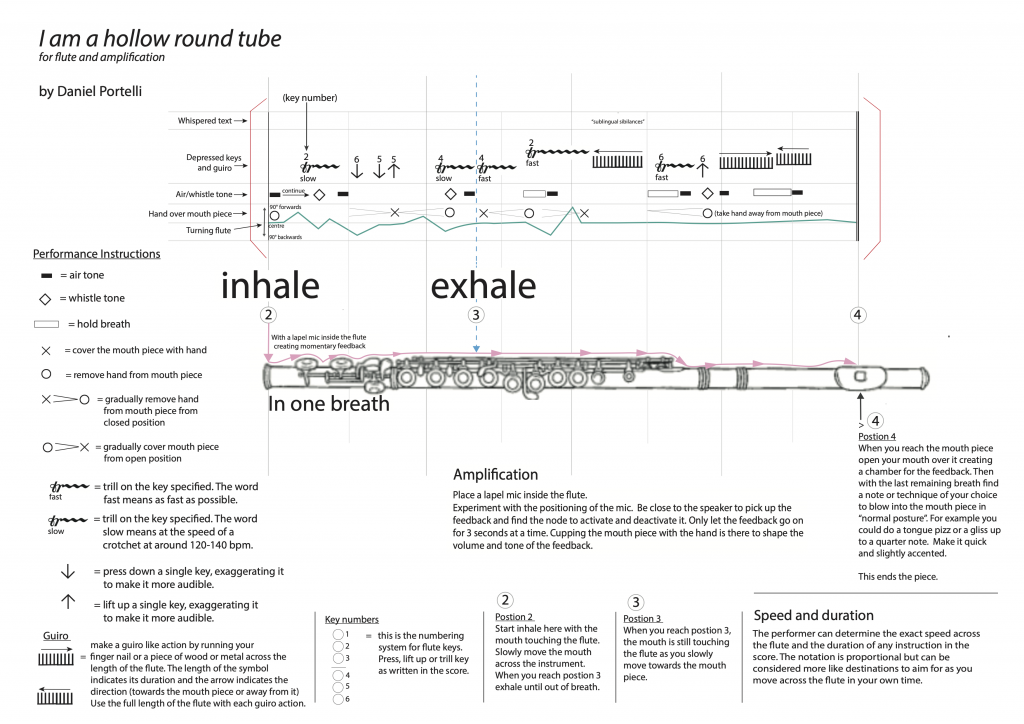
For more details see the full score.
You can also see the score for another work for piccolo and electronic playback called Ontogeny (2019)
Culture in a time of crisis: Cultural resilience seminar series
I presented a paper in a seminar series at WSU entitled ‘Cultural resilience in a time of crisis’. The presentation outlined my creative practice and investigated critical cartography, counter-mapping and aesthetics, in support of decolonial research and perspectives in Australia. This coincided with the destruction of two ancient indigenous caves by mining giant Rio Tinto in May 2020. The talk follows the release of my multimedia work ‘Mapping Australia’ on the 2020 album ‘Playing with fire’. Here is an except of what I wrote about the value of art:
“Art can be a powerful solace. A refuge from catastrophe. Artistic work can propose a different outlook and suggests other ways the world could be. Creativity helps us endure and persevere through life’s complexities, uncertainties, and traumas. We can express perspectives that get submerged amongst the noise. Through art, we can challenge inequalities and give voices to the voiceless. It promotes acceptance of difference, and diversity of expression. It connects us to the multiplicity of life, and how we relate to the world.”
You can also read more about the seminar in a long form post written by the sound designer/academic behind the project Dr Ian Stevenson (UTS), who discusses our long term collaborative process:
You can also watch the entire lecture below:
Atlas of the Sky
I was lucky enough to be part of a crowd of 16 local performers in the music theatre work “Atlas of the Sky”, a work by internationally acclaimed Australian composer Liza Lim, along with Speak Percussion, and soprano Jessica Aszodi (City Recital Hall, Sydney Festival, 2020). We were on stage providing theatrical, vocal, and percussion accompaniment. We did a range of things including: bowing cowbells, singing, using a waldteufel as a geiger counter, a protest march, and bowing a children’s Ikea chair with a rasp stick.
https://speakpercussion.com/work/atlas-of-the-sky/
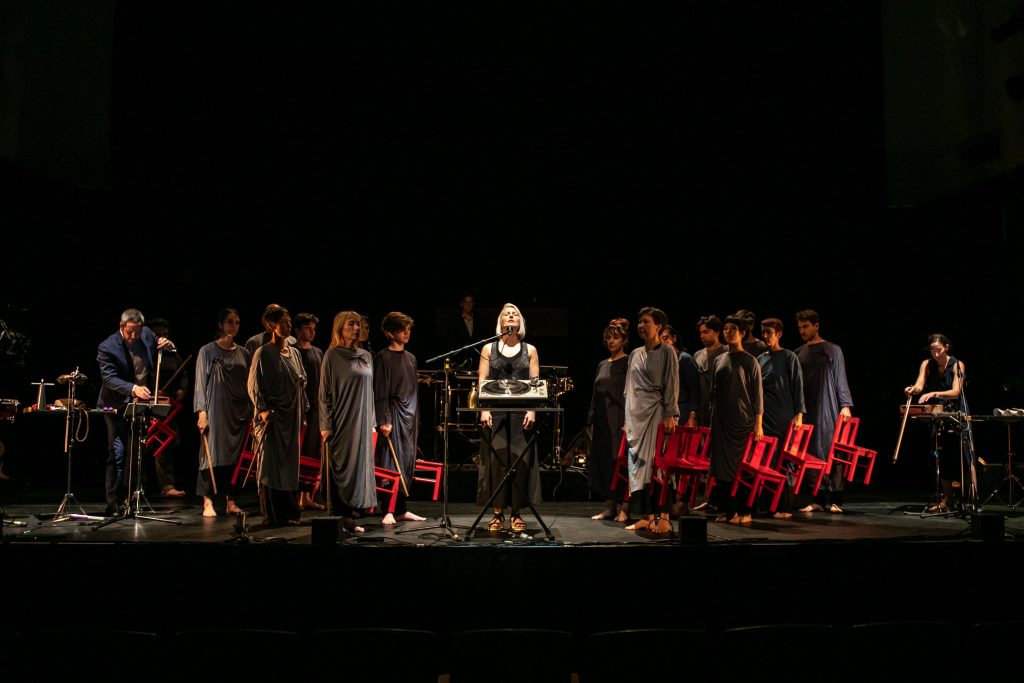
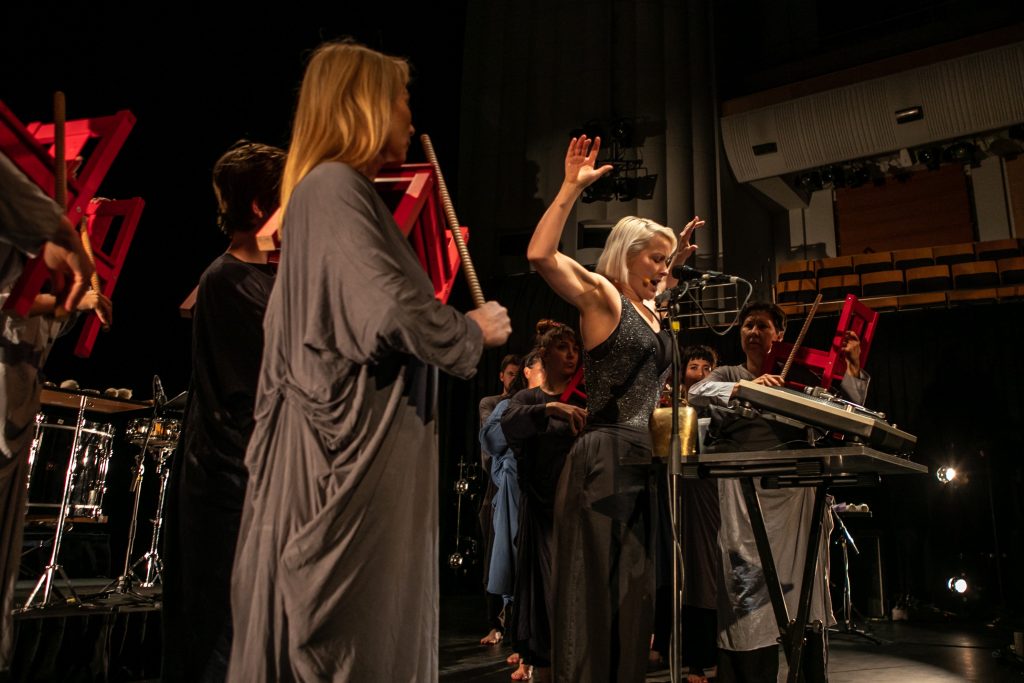
Online publication and radio broadcast
Daniel’s piece ‘Memory Tape’ was featured by the online music journal ‘Making Waves’ on their February 2019 edition called ‘Waves of Consciousness‘. Making Waves are a monthly curated series that features Australian art music. Check out the video of my work, performed by Stephen Menotti (trombone) and Ellen Fallowfield (cello), and other featured artists.
The piece was also broadcast to radio on the ‘Australian Sounds’ program on 3MBS Fine Music Melbourne on the 15th February 2019.
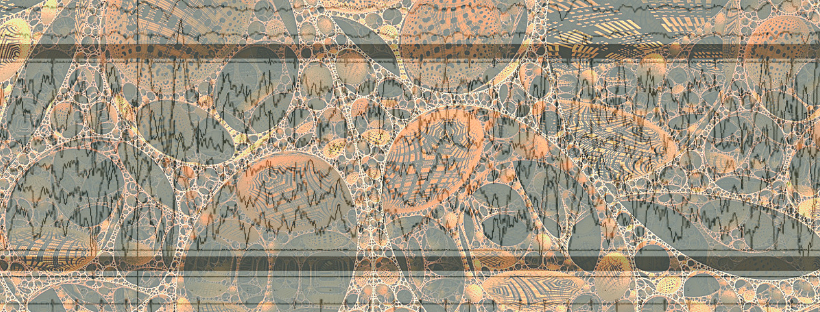
Composer in residence
Daniel was composer in residence in a 16-week multi-art-form collaboration project in Western Sydney. It was part of the DIG space residency (September to December 2018) with Penrith City Council. He wrote a series of miniature pieces for a website relating to books to inspire young adults to read and engage with the library. The music is accompanied by cinemagraphs and graphic manga style artworks. The music was rehearsed and recorded at the studios at Western Sydney University, Kingswood, NSW, Australia. Performed by: Tim Hans (piano), Justine Bristow (flute), Zenith Chae (cello), Daniel Portelli (percussion), with electronics and field recordings.
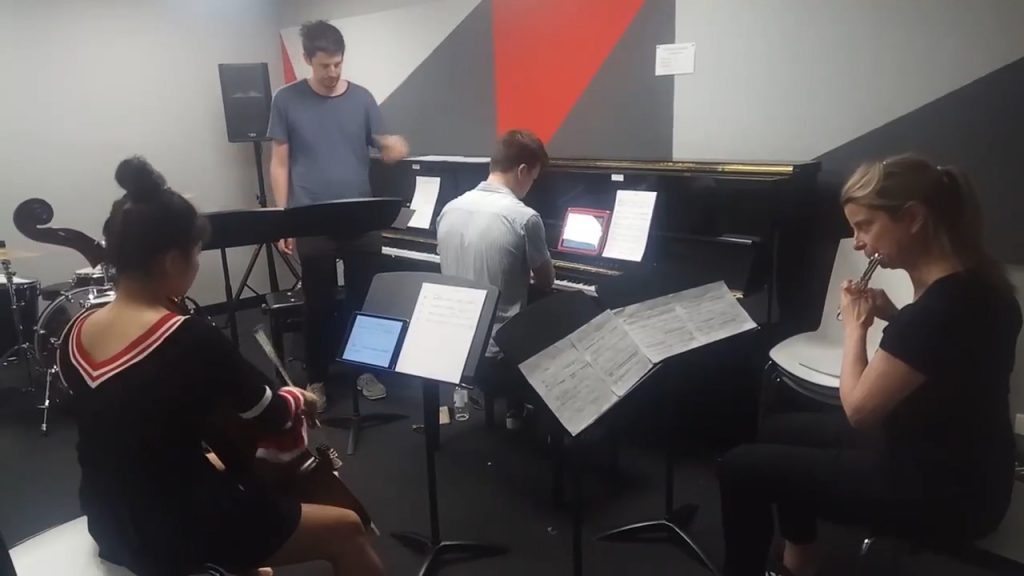
Composer lecture at the Sydney Conservatorium of Music
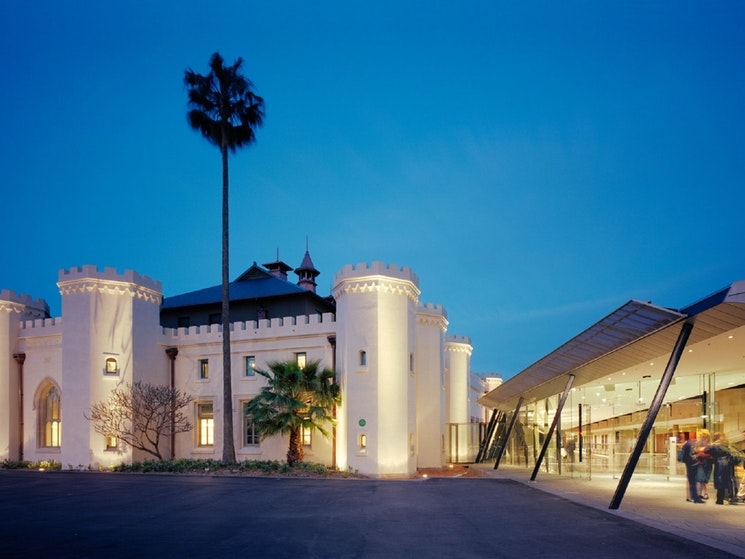 In May 2018, I gave a lecture to composition students at the Sydney Conservatorium of Music. I spoke about my creativity and research into the work of social anthropologist Tim Ingold who I met in a workshop at Leeds University in 2014. I compare his work to the contemporary dance methodologies of William Forsythe, particularly ‘Improvisation Technologies: A Tool for the Analytical Dance Eye’, which is a dance method for navigating imagined lines in space. Take for instance the concept of the ‘world line’ in particle physics. As a particle moves through ‘events’ in time, these events can be linked together to form a line, becoming the particles world line. Ingold studied the unique structure of fungi (lines and folds) and this influenced his understanding of social relations and our connection to our environment. He establishes a language of lines as found in activity such as weaving, storytelling, singing, walking, drawing, observing, and writing. I use his theory on the ‘correspondence of lines’ as a transformative process in my compositions (as music-gestural lines). And developed a video ‘sketching’ process for music making, outlining a multimodal approach to composition.
In May 2018, I gave a lecture to composition students at the Sydney Conservatorium of Music. I spoke about my creativity and research into the work of social anthropologist Tim Ingold who I met in a workshop at Leeds University in 2014. I compare his work to the contemporary dance methodologies of William Forsythe, particularly ‘Improvisation Technologies: A Tool for the Analytical Dance Eye’, which is a dance method for navigating imagined lines in space. Take for instance the concept of the ‘world line’ in particle physics. As a particle moves through ‘events’ in time, these events can be linked together to form a line, becoming the particles world line. Ingold studied the unique structure of fungi (lines and folds) and this influenced his understanding of social relations and our connection to our environment. He establishes a language of lines as found in activity such as weaving, storytelling, singing, walking, drawing, observing, and writing. I use his theory on the ‘correspondence of lines’ as a transformative process in my compositions (as music-gestural lines). And developed a video ‘sketching’ process for music making, outlining a multimodal approach to composition.
Abstract from the lecture:
This talk draws on lines in art and anthropology to create a framework for structuring a discussion about sound, listening, gesture, video notation, cross-modality, and the visual arts. Music gesture is shown to be meaningfully connected to the world around us. My creative practice engages with Ingold’s ‘correspondence of lines’, along with other dialogic lines found in contemporary dance, video art, nomadic travelling, non-human movement, and abstractions in art. Gestural lines of a performer are sampled and ‘mapped’ into video matrices for further interpretation in a music performance. My video scoring processes are used to infuse the abstract notion of the line with historical socio-political meaning.
I engage with the concept of the ‘mesh’ as a collection of such lines that are interwoven and interconnected. Sonic form in my work arises from a meshwork of lines of entanglement, movement and growth. This discourse of lines is contextualised through examples of absurdist instrumental theatre, graphic video scores and corporeal based music.t
****
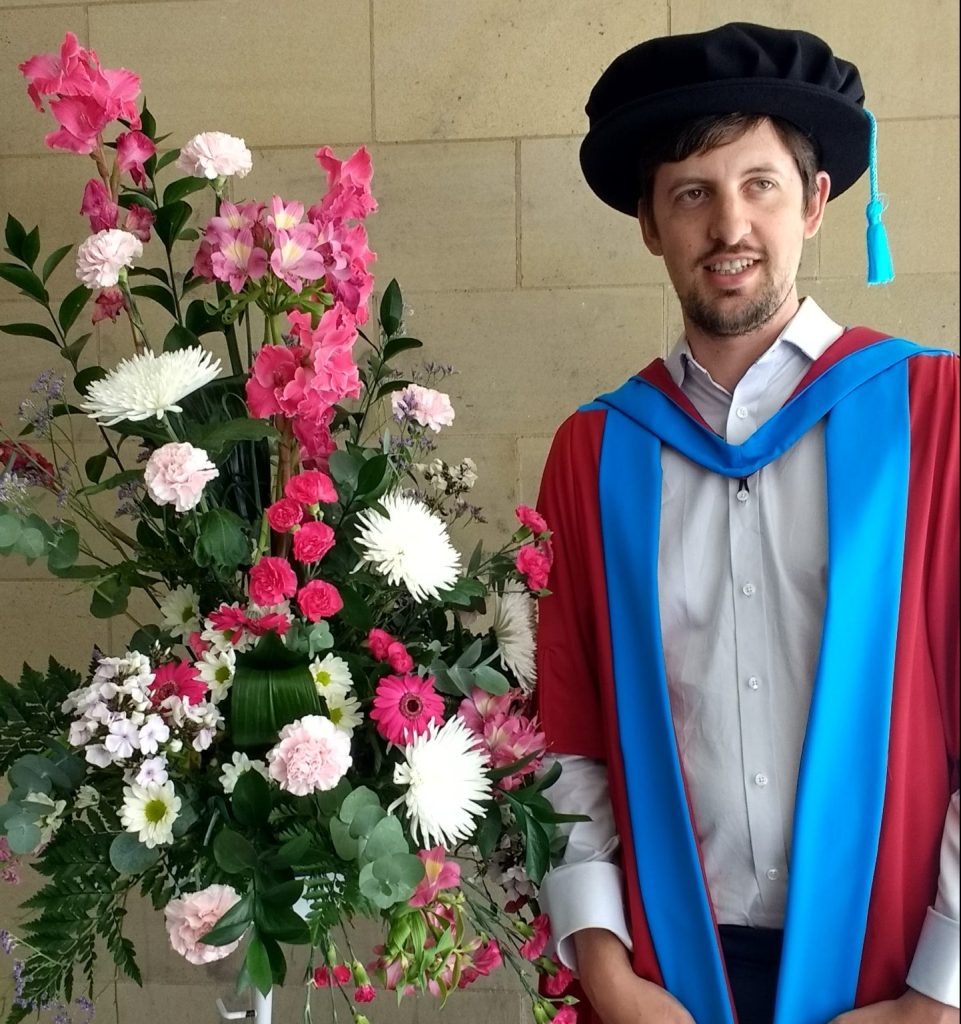
Graduated with a PhD in composition from the University of Huddersfield in 2017
Daniel is now a represented artist with the Australian Music Centre. You can read his full biography below and scores are now available to purchase here.
https://www.australianmusiccentre.com.au/artist/portelli-daniel
Composer quotes from the website:
 “My music is a form of line-making, heard and experienced as radiant energetic lines drawn through space in time. A meshwork of sensory surplus, where objects and points break down.”
“My music is a form of line-making, heard and experienced as radiant energetic lines drawn through space in time. A meshwork of sensory surplus, where objects and points break down.”
“I use video as a sketching process for composition. It becomes the primary ‘corresponding’ tool for the development of a multimodal practice; a mediating element for building vocabularies between the auditory, the kinaesthetic, the tactile, and the imagination.”
Library shelf no. 783.66542/POR 1 [Available for loan]
Work Overview
A Sense of Space is for flute, guitar, and soprano with percussion. It works with different levels of magnification of instrumental timbre that reveals shades of grains and particles. The particulate sound vocabulary includes scratching on guitar strings with different durations and speeds, the sounds of crumbling shredded bamboo, and the brushing of sandpaper on wood. The vocalist with her phonation of breaths and whispers emulates these qualities. The piece is without words or text. Instead, language is disassembled down to phonetics, vowels, fricatives and air.
I came across a shredded bamboo wok cleaner at a Chinese supermarket in Haymarket, Sydney. It makes a crispy, crackling sound that I wanted to explore in a musical work. I was inspired by its noise spectra and found that these sounds can interrupt or mask momentarily the more pure and fragile tones of the flute and guitar. There are sections where the speed and the amount of activity increases which may overload the capacities of some listeners for a brief moment. I call this a ‘mesh’, and it is phenomena I openly embraced and brought into my musical language. The piece can then be thought of as a subtle play between ambiguity and clarity.
Similar categories of timbre sit within a spectrum that can be identified as distortion or an airiness of tone. Degrees of density or resistance are shaped, where physical pressure is the key parameter for controlling the audibility of the graininess or grittiness of each surface. My instrumental approach is also about articulating a kind of dynamism through gestural variations, where parts of the score are also recycled but may go unnoticed because of their slight alterations. Time may appear to want to move forward but is stopped by an uncanny sense of stasis. Pauses and attenuations often occur after sections that are populated with the dense sound activity of a flourishing string of micro-tonal pitches, and parts offset in uneven rhythms. The frequent interpolation of rests as well as quiet passages allows the sounds of the performance space to become more present to audience attention. For me, the sounds of the space where intended to be listened to during these moments and are part of the work. The audience are therefore encouraged to listen openly and embrace the sounds around them during the piece.
Premiered on 5 March 2016 by Alba Bru Carci (flute), Diego Castro Magaš (guitar), Peyee Chen (soprano/percussion) at St. Paul’s Hall, University of Huddersfield, UK.
Poetic energies across sonic space / music and symposium with a cross-artform attitude of the Chinese literati
My piece Serpentine for erhu and percussion with video and spoken poetry was premiered by Claire Edwardes and Liu Ying on the 20 July 2017 at The Playhouse, Western Sydney University, Penrith Campus (Kingswood), in Australia.

Serpentine is a multimedia piece for erhu, percussion and spoken word. It centres around the winding shapes and lines of movement such as those made by a serpent or snake. Lines in the music have a flexible identity, and manifest as asymmetrical percussive displacements, distorted grains and swarms of sound, pitch contours and energetic movements between performed actions. The video also portrays this curvature patterning through the use of a handheld camera that follows lines filmed on the side of the road. This is complemented by the story lines that emerge in Aden Rolfe’s spoken poem. Collected from his work, ‘The Heavenly Emporium of Benevolent Knowledge’, which is a poetic muse on the Australian bush. Fragments of the text include: “The landscape is a system, a geometry of soil and sky”, “You cant think of a line without tracing it in our mind”, “What the rock doesnt say about itself”, “But whoever said you can only walk half way into the forest, has never been lost.”
In a section of the score the erhu player follows a video score containing an oscillating yellow sine wave and a flashing circle indicating fingered pitch positions and the point of contact with the bow respectively. The percussionist follows two rotating clocks that point to different percussion instruments indicating when to strike them. The graphic video notation is combined with staff notation, which becomes a play with the perception and orientation of time.
You can watch a video of the work here
A Sense of Space / Music for Tracensemble
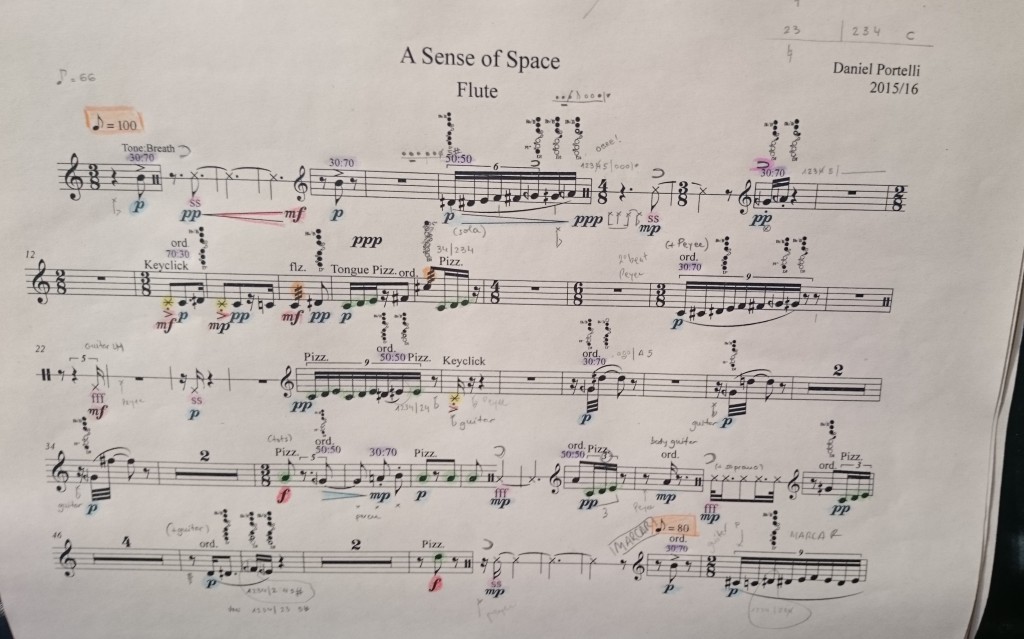
Commission with contemporary ensemble ESMUC in Barcelona
My piece Lines of Fragmentation (2015) for trumpet, trombone and two percussionists had its world premiere on 17th February 2016, performed by ESMUC Ensemble, conducted by Lorenzo Ferrandiz Carrillo at the L’Auditori in Barcelona as part Sampler Series Festival about ‘Music and Architecture’ which paid homage to Iannis Xenakis and Edgar Varèse who also featured on the program. An article about the work appeared on the website Núvol, a digital newspaper of culture in Catalan, which states: “The first release is Lines of fragmentation (2016), from Australian Daniel Portelli. It is a combination “very difficult to amalgamate at the level of color”, as it is for trumpet, trombone and two percussionists. According to Vicent Minguet, “the Australian compares his work with a swarm of birds and their multiple movements. With this approach, Portelli retains a difficult consistency, achieved thanks to the way they draw the broad lines of an irregular nature to which the title of the piece refers.”
https://www.nuvol.com/musica/classica/sampler-presenta-esmuc-ensemble-33163
Robotic piano composition and workshop
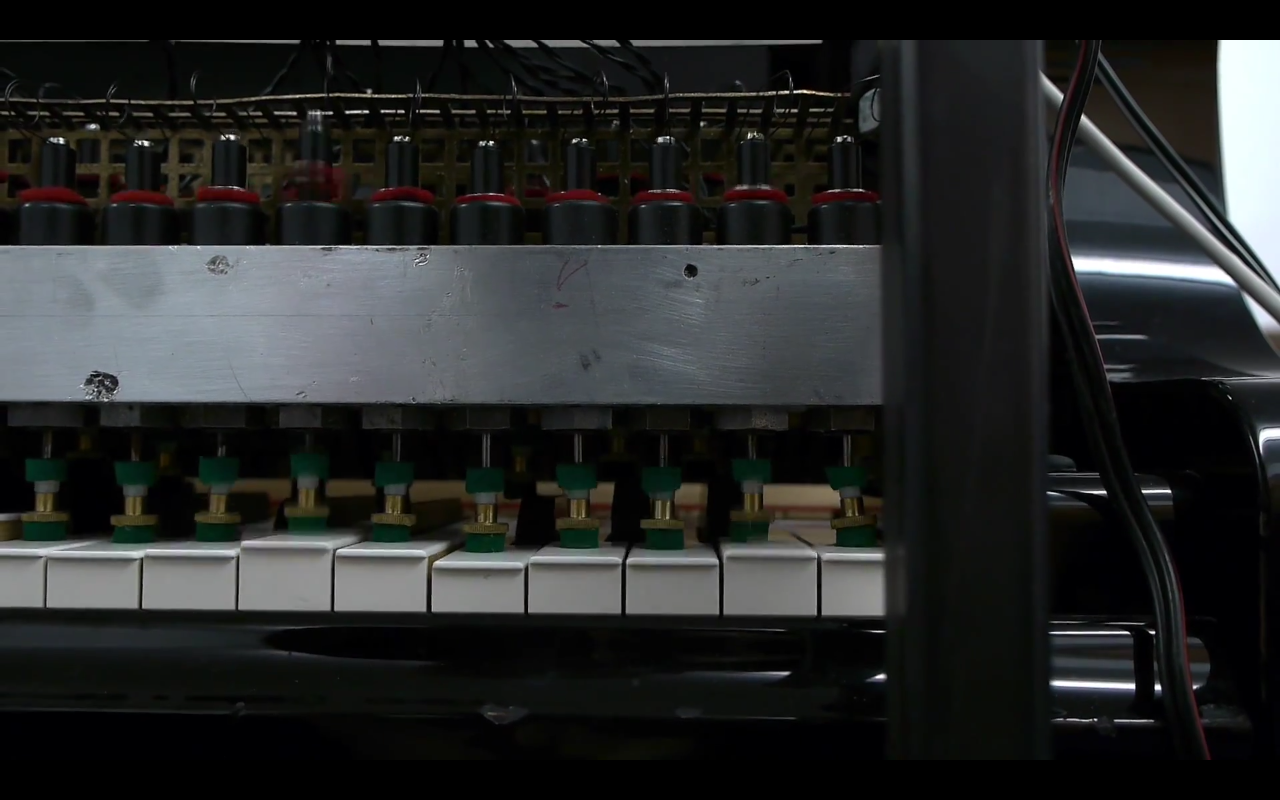 I was involved in a robot piano workshop with Professor Peter Ablinger (University of Huddersfield) and Professor Winfried Ritsch (Institut für Elektronishe Musik und Akustik, Graz) where they brought their computer-controlled/robot piano ‘RHEA’ to the Centre for Research in New Music (CeReNeM) at the University of Huddersfield. From 19th – 25th October 2015.
I was involved in a robot piano workshop with Professor Peter Ablinger (University of Huddersfield) and Professor Winfried Ritsch (Institut für Elektronishe Musik und Akustik, Graz) where they brought their computer-controlled/robot piano ‘RHEA’ to the Centre for Research in New Music (CeReNeM) at the University of Huddersfield. From 19th – 25th October 2015.
A concert of works were performed on 25 October in Phipps Hall at the University of Huddersfield. You can watch the premiere of my piece, Hyperbodies, here
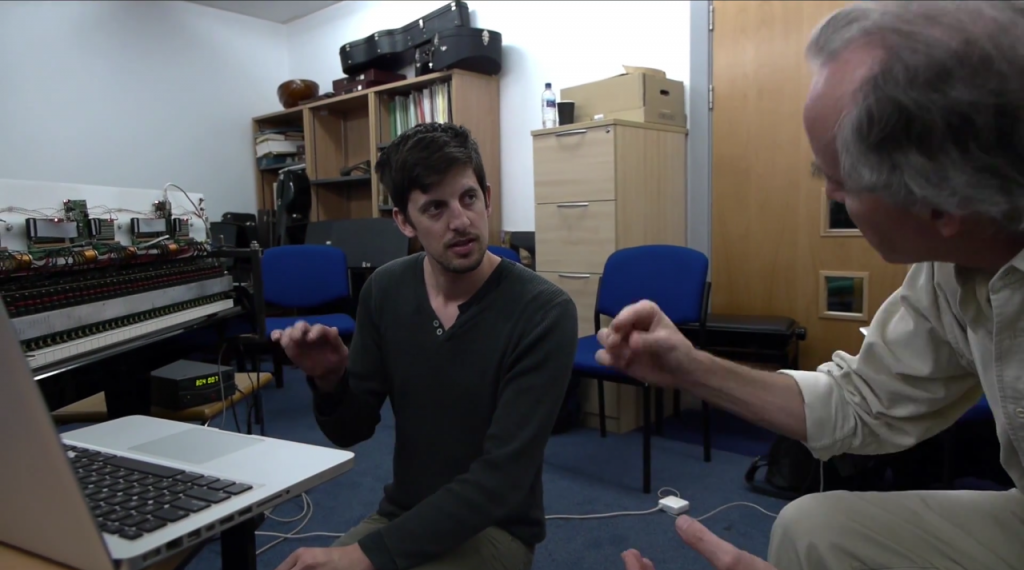
See Peter Ablinger’s ‘Speaking Piano’ piece, which uses the same robotic piano: https://www.youtube.com/watch?v=muCPjK4nGY4
A documentary was made by filmmaker Angela Guyton, which allows you to see inside the processes behind these workshops and RHEA’s week-long residency at CeReNeM.
Jan-May 2015 - Updates
Journal Publication – My article ‘Mapping Australia’ features in the fifth issue of the CeReNeM Journal. The journal is an online interactive website, written, edited and designed by my colleagues at Huddersfield University. Edited by PhD composer David Pocknee and web design by artist Ana Lemnaru, they have created an innovative and beautiful platform to showcase recent research in music. This issues journal covers touch, cartography, topology, nuns, pornography, synaesthesia, membranes, desire, exploded instruments, Beethoven’s piano usage, slow-motion performance, piano destruction, Australia, Big Data and trumpets.
Full Journal: http://cerenem.ricercata.org/
My Submission: http://cerenem.ricercata.org/articles/mapping_australia/page01.html
My piece Animal was reviewed in the newspaper ‘The Australian’. The piece was premiered at the Samstag Museum in Adelaide on the 12 April 2015:
“The second work premiered, Animal by young Sydney composer Daniel Portelli, drew text from the National Inquiry into Children in Immigration Detention 2014, consisting of recollections of children who were held in detention.”
“Positioned upstairs in a balcony, sopranos from the Adelaide Philharmonia Chorus whispered their words like a hovering throng of tiny lost souls above the audience’s head. Then a burning flame, projected in slow-motion video, symbolically incinerated all memory of them.”
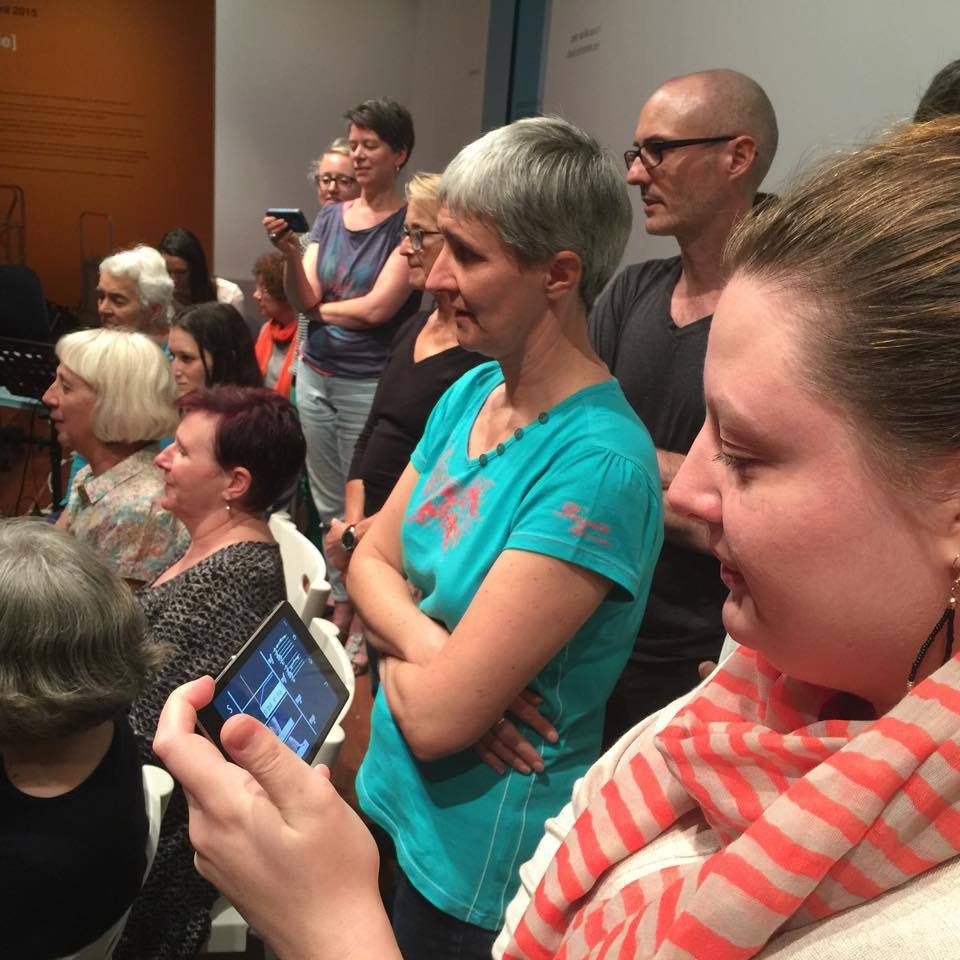
Information about my music and multimedia work Animal (2015):
“Soundstream Collective performs Silence augmenteth grief in the year that marks the 100 year centenary of the ANZAC landing at Gallipoli, acknowledging the grief caused by war which is followed by suppression and silence. Featuring works by Liza Lim and Stuart Greenbaum, with world premieres by Jon Rose, Peter McNamara and Daniel Portelli and conducted by Vienna-based Warwick Stengaards. Soundstream Collective expands its group to include electronics, string quartet, video and the Adelaide Philharmonia Chorus in this emotionally charged program of works by leading Australian composers.”
The performance is on 16 April 2015 at the Anne & Gordon Samstag Museum, University of South Australia, Adelaide.
Impus Music Academy
At Impuls Music Academy in Graz, Austria I made Copy-Make (2015), an interactive video installation as part of creative series called Composition Beyond Music (from 13-25th February, 2015).
The work is a visual representation of my compositional process where physical gestures are captured and played back simultaneously as individual .gif like sequences repeating at different rates in a 3 by 3 grid, on transparent paper.
Meeting with composer Richard Barrett
At Impuls, i had the opportunity to meet with composer Richard Barrett and have a comprehensive discussion about composition and my creative practice.
Memory Tape
Performed by:
Stephen Menotti – Trombone
Ellen Fallowfield – Cello
http://www.cellomap.com/
http://www.en.eunoiaquintett.com/musicians.html
With reel-to-reel tape machines and small speakers spread out across the room playing samples of tapes crackling.
Performed at St Pauls Hall at Huddersfield, UK
LIVE: CeReNeM PGR Daniel Portelli rehearsing w/ Ellen Fallowfield & Stephen Menotti. Premiere tomorrow! pic.twitter.com/Doq7EYisVQ
— CeReNeM (@HuddCeReNeM) 4 February 2015
Tokyo Music Festival - 2014 Updates
Composer Bruce Crossman reports from the Asian Music Festival 2014, held in Yokohama and Tokyo 1-7 November.
“Australian composer Daniel Portelli produced a work of living breath that undulated its way into being. Portelli’s piece, entitled Undulations, explored shakuhachi-like breath qualities of two soprano saxophones whose long airy dronal qualities were reed-stabbed with dabs of colour which gradually grew in density and tension before subtly subsiding back into breath tones. The unpredictable inevitability of the shifting dabs of colour harkened to Jackson Pollock-like ‘blue poles’ of sound. This visual approach to sound is something that the late venerable Peter Sculthorpe identified as an Australian approach to sound perhaps drawn from a visual landscape culture and certainly expressed in his Sun Music series.”
Living Breath, Juxtapositional Flow and Emergent Spirit
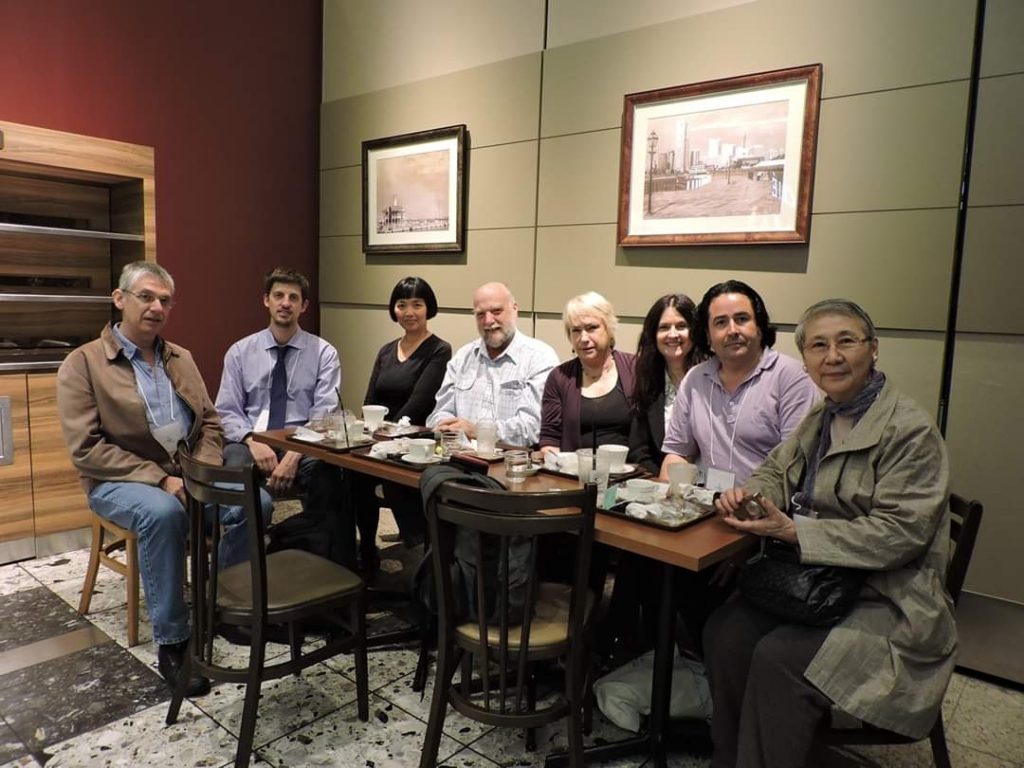
My performance at Soundstreams Emerging Composers Forum in Adelaide on 4 November 2014 won the Winston Music ECF commission of $1500 for my piano multimedia work, Mapping Australia (2014). Performed by Gabriella Smart, the concert was recorded to be broadcast on ABC Classic FM’s New Music Up Late program on 29 November at 10:30pm. I was also asked to write a new work for the Soundstream Collective.
 http://www.theaustralian.com.au/arts/music/emerging-composers-show-talent-without-adhering-to-the-butterfly-effect/story-fniwj43s-1227113843104
http://www.theaustralian.com.au/arts/music/emerging-composers-show-talent-without-adhering-to-the-butterfly-effect/story-fniwj43s-1227113843104
Daniel recently represented Australia as the Young Composer Representative at the Asian Music Festival 2014 in Tokyo and Yokohama from 1-7 November 2014.
My piano work Mapping Australia (2014) was chosen by a jury to be performed at
Soundstream: Adelaide New Music Festival.
This is what was said about the competition: “A large number of works were received and the mentoring composers, Stephen Whittington (AUS), Melody Eotvos (AUS) and Jan-Bas Bollen (Nl), acknowledged that the selection process was intense, due to the quality of the works submitted. Melody Eotvos commented on the outcome: ‘the five scores that we did choose will certainly all be very strong contenders for the commissions.’
Here is a media article about my work Undulations (2014) for two soprano saxophones:
Works by Crossman, Dillon, Pertout, and Portelli at the ACL Festival in Japan
I participated in an insightful workshop by the Social Anthropologist Tim Ingold, at Leeds University. Run by CePRA (Centre for Practice-Led Research in the Arts).
The event focused on Ingold’s research into overcoming the distinction between ‘practical’ and ‘intellectual’ craft, and related problems such as the tension between ‘creativity’ and ‘research’, or whether we might think of a new word – not ‘research’, not ‘scholarship’, but something else instead – to describe the generation of new knowledge.
http://www.cepra.leeds.ac.uk/events/tim-ingold-seminar-workshop/
I have been selected to represent Australia at the Asian Composers League Young Composer Competition at the 32nd Asian Composers League Conference and Festival, 2-7 November, 2014 in Yokohama and Tokyo, Japan, with my work Undulations for two soprano saxophones.
I participated in a workshop reading session of my work Falls and Rises (2014) with soprano singer Peyee Chen as part of the Centre for Research in New Music Program (CeReNeM) in Huddersfield, England.
Started a PhD at Huddersfield University (UK) in 2013 with main supervisor Liza Lim and co-supervisor Julio D’Escrivan.
2010-2012 – MA (hons)
Completed a Master of Arts (Hons) in composition at the University of Western Sydney with principle supervisor Bruce Crossman and co-supervisor Ian Stevenson.
My orchestral work Finding Kensho was performed by the Melbourne Symphony Orchestra as part of the Cybec 21st Century Australian Composers’ Program – with mentoring by Australian composer Nigel Butterley.
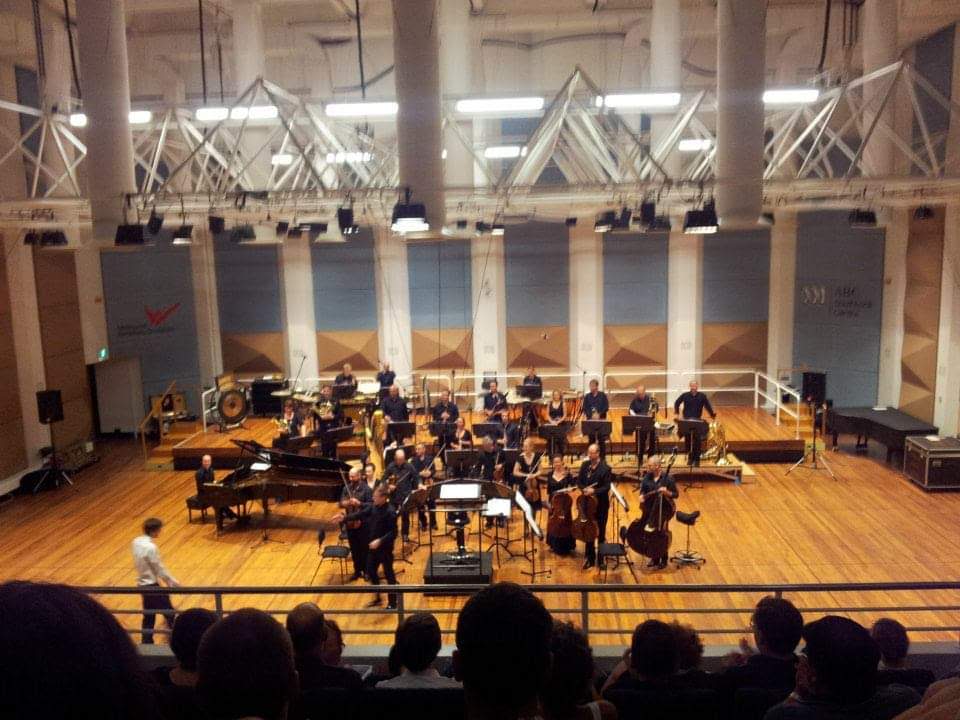

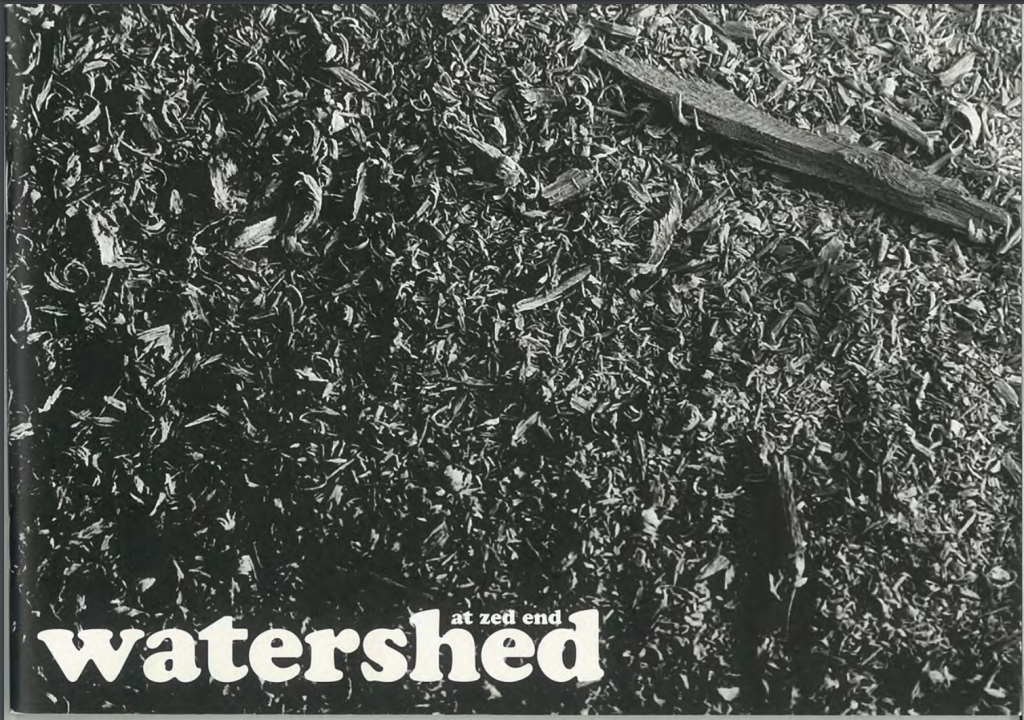
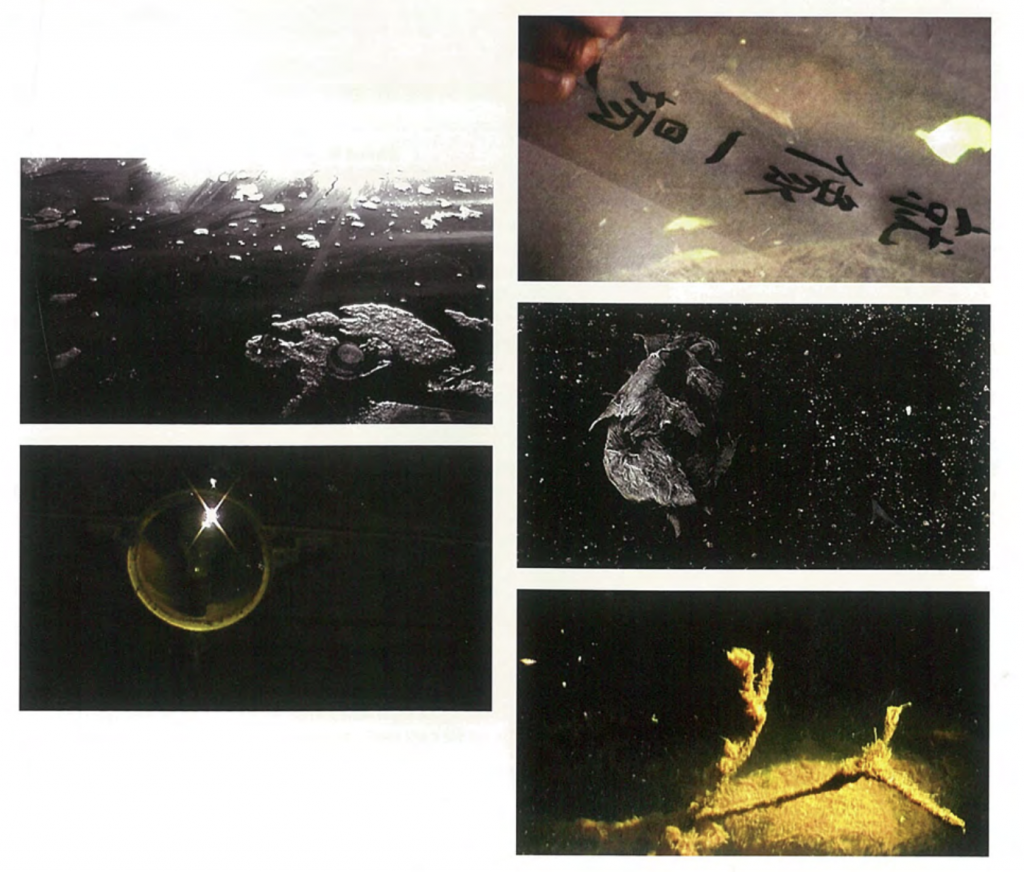
Western Sydney University graduation exhibition of Fine Art, Electronic Arts and Music at Bay 19, Carriageworks, Everleigh, Sydney, 2009. The exhibition, Watershed at zed end, marked the end of ‘Z block’ and the Fine Arts and Electronic Arts degrees at Western Sydney University. Much of the footage was shot locally in at South Creek in St Mary’s, Mt Druitt, and on Cockatoo Island.
All rights reserved © 2009-2024 Daniel Portelli
